

Issue 10 | November/December 2021 LATEST // MAREX & FIRST BITOLINKED AUTOCALL p22 SG // HNW DEMAND SOCIAL IMPACT p34 ANALYSIS // THE EVERGRANDE STORY p38 @SRP_Insider POSITIVE IMPACT SRPInsight






The Application Programming Interface (API), is a web-based software application which allows clients to access our data in a controlled manner & integrate it using their own software packages & systems.
Retrieve.

• Download real time SRP data directly to excel
• Receive market share on each asset class/payoff for each company of interest
Interrogate.
• Monitor & increase your market share
• Carry out accurate trend analysis with comprenhensive product data spanning over 15 years in seconds
Incorporate.
• Import data directly into in-house systems/platforms and interrogate the data and risk more effectively
• Combine data sets with other products and visualise it in the context of the larger business


Amelie Labbé, Pablo Conde, Lavanya Nair, Summer Wang, Marc Wolterink

Paul
If you are interested in having a similar bespoke report produced for your organisation, please
Reihaneh
T: +44 (0)20 7779 8220
M: +44 (0)79 8075 6761
E: Reihaneh@structuredretail products.com
REPRINT POLICY:
SRP’s Reprint Policy: Articles published by SRP can be sent to sources for reference and for internal use only (including intranet posting and internal distribution). If an article is to be shared with a third party or re-published on a public website (i.e. a location on the World Wide Web that is accessible by anyone with a web browser and access to the internet), SRP offers reprints, PDFs of articles or advertisements, and the licensing to republish any content published on the SRP website. Prices vary depending on size, quantity and any additional requirements. To request authorisation to republish any Q&A, profile or feature published by SRP, please contact: info@structuredretailproducts.com
Front cover image: Casey Horner / Unsplash
3 www.structuredretailproducts.com SRPInsight CONTENTS Contents News Europe 4 News Americas 10 News Apac 16 Latest: Marex 22 Feature: Leonteq 24 Feature: Morgan Stanley 26 Q&A: Spectrum Markets 28 Q&A: CACIB 30 Q&A: Barclays 32 Q&A: SG Private Banking 34 Expert View: US Market Reviews 36 Expert View: The Evergrande Story 38 Product wrap 40 People moves 43
Kimona Bonnick
Fakhari
Pancham Monique
Reihaneh
Fakhari
ESAs ask for ‘experiences,’ further Priips changes needed
The European Supervisory Authorities (ESAs) have opened a call for evidence regarding the Priips Regulation.
The ESAs are requesting information from the industry on a range of topics including the practical application of the existing key information document (KID) such as its use by financial advisors or the use of digital media, the scope of the packaged retail and insurance-based investment products (Priips) Regulation and the degree of complexity and readability of the KID.
The call for evidence follows the request for advice from the European Commission of 27 July 2021 in preparation of legislative proposals implementing aspects of the retail investment strategy, and more specifically regarding a review of Regulation (EU) 1286/2014 on packaged retail and insurance-based investment products (Priips).
In the original mandate, the Commission had requested the ESAs a general survey on the use of the KID; a general survey on the operation of the comprehension alert in the KID; and a survey of the practical application of the rules laid down in the Priips Regulation.
With the new consultation, the ESAs are collecting further industry feedback ‘on a range of other issues’ not identified in the mandate provided by the Commission.
The Commission is asking for an assessment of the effectiveness of the administrative sanctions, measures, and other enforcement actions for infringements of the Priips Regulation; an evaluation of the extent to which the Priips Regulation is adapted to digital media, and an examination of several questions concerning the scope of the Priips Regulation.
Some of the questions of the consultation ask respondents to provide ‘experiences’
regarding a certain issue or topic.
‘This might include whether the views are based on actual experiences, such as selling, advising on, or buying Priips, a survey of market participants, academic research undertaken etc,’ states the report. ‘Manufacturers of products, which currently benefit from an exemption to produce a KID, such as fund managers, are not precluded from sharing evidence or experience under this call, but should clarify the context in which they would provide comments.’
SCOPE
Some of the areas of focus in the review include the complexity and readability of the KID, performance scenarios and past performance, Priips offering a range of options for investment (multioption products, or MOPs) as well as the alignment between the information on costs in the Priips KID and other disclosures requirements in Mifid and IDD.
The consultation is closely connected to the Commission’s Capital Markets Union (CMU) Action Plan and its future strategy for retail investments in Europe.
The CMU Action Plan aims to boost market-based financing in the European Union to help chart a return to longterm growth and to finance the green
and digital transitions of the continent’s economy. With its strategy for retail investors, the European Commission wants to offer consumers increased investment opportunities and stronger investor protection on the capital markets.
The input provided will feed into the ESAs’ technical advice to the Commission on the KID for Priips review.
In response to a recent consultation by the UK FCA on post-Brexit Priips divergence, the country’s association of advisers and investment managers is calling for a fundamental review of the Priips regime rather than a ‘sticking plaster’ approach.
Earlier, in September, the European Structured Investment Products Association (Eusipa) with other major financial sector associations requested a sufficient timeline to implement the Regulatory Technical Standards (RTS) on the EU Priips Regulation endorsed by the EC.
The deadline for the ESAs to provide their advice is 30 April 2022. The call for evidence is open until 16 December 2021.
The ESAs also plan to hold a stakeholder event in Q1 2022 before finalising the advice to present the findings of the consultation.
Some of the areas of focus in the review include the complexity and readability of the KID
4 www.structuredretailproducts.com NEWS | EUROPE
VLK, ING debut Refinitiv ESG index
The two Dutch banks have partnered for their first public offer since 2013.
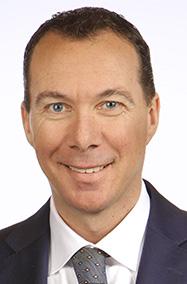
Van Lanschot Kempen (VLK) is distributing the Index Guarantee Note ESG Global Dividend 21-28 in the Netherlands.
The seven-year, capital-protected note is issued on the paper of ING. It is denominated in US dollars and participates 100% in the rise of the Refinitiv ESG Global Select Dividend 40 Index, which makes its debut on the SRP database.
The main reason for the launch of the product is to offer a rollover opportunity for the VL USD Capped Index Garantie Note Wereld 19-26, which is currently trading well above the minimum redemption (118.45% on 18 October 2021), according to Marcel Pronk (pictured), director securities marketing structured products, at Kempen & Co.
“Investors in this product who would like to secure their profit can sell it and rollover in the new note,” said Pronk.
The Refinitiv ESG Global Select Dividend
40 Index has been developed by ING and tracks the performance of 40 companies from the Refinitiv Global Developed Market Index that actively invest in and promote environmental, social and governance (ESG) values and principles in the running of their businesses. The index is a weighted index with a constituent’s cap of five percent.
“The starting point in selecting the underlying index for this product launch was the desire from our private bank to offer a product with 100% minimum redemption and global equity exposure.
“Furthermore, our internal investment view is that value shares will outperform growth shares in the coming period because of most Covid 19 restrictions have been lifted and the expected economic recovery,” said Pronk, adding that an index that selects high dividend paying shares will normally have a significant exposure to these value shares.
The index is the second ING proprietary index that meets several sustainable criteria. Over the years, the bank has seen a strong inflow in structured products linked to its Solactive Sustainable Europe Low Risk Equity Index, according to Sander van Baren, director, investment products retail solutions, ING Bank.
“There is an increasing demand for this type of indices and therefore we developed the Refinitiv ESG Global Dividend 40 Index to increase the offer of ESG benchmarks for structured products. The index combines the use of ESG screens with a selection of global shares with an attractive dividend yield and diversification between sectors and regions,” said Van Baren.
Sustainability is one of the strategic pillars of VLK and the bank takes ESG factors into consideration in all the investment propositions it offers to clients. However, within structured products, it is sometimes quite challenging to find a suitable ESG underlying, said Pronk.
“The Refinitiv index proposed to us by ING did fit into our internal ESG guidelines and because it combines ESG factors with exposure to global high dividend paying shares it was a perfect fit for this product launch.”
This is the first time in the eight years that VLK and ING have collaborated for a public offer in the Netherlands. The last time the two banks worked together was in 2013 when ING Index Guarantee Note Eurozone May 13-20 was launched, although there have been a number of ING products that were offered to VLK clients on a private placement basis since.
Within structured products, it is sometimes quite challenging to find a suitable ESG underlying
5 www.structuredretailproducts.com NEWS | EUROPE SRPInsight
Causeway, Barclays track Solactive climate change play in the UK
The UK brokerage has deployed a Barclays proprietary index for its first deposit plan.

Causeway Securities has launched the Climate Change Deposit Plan November 2021 in the UK.
The six-year capital-protected product offers 200% participation in the Solactive Climate Change Europe BTI PR Index, capped at 36%. It is the company’s first deposit plan, and its first collaboration with Barclays Bank, which acts as the deposit taker.
“We have been planning to launch a UK deposit product for some time and feedback from our extensive market research has indicated that UK investors are keener now more than ever to make more environmentally led decisions in terms of their portfolio composition,” Chris Moody (pictured), head of UK sales, Causeway Securities, told SRP.
“Research suggests that investors are no longer solely interested in the financial performance of a company, but also the impact of their investment.”
According to Moody, the deposit format of this product allows for greater investor comfort, given that each client’s deposit is protected up to a total of £85,000 by the Financial Services Compensation Scheme (FSCS).
The launch of Causeway’s first Climate
Change deposit is timely ahead of November’s COP26 meeting in Glasgow, where world leaders will discuss their climate commitments; and also Treasury’s announcement on the new sustainability disclosure requirements for some large UK businesses, which will mean they will be obliged to disclose their firms impact on the environment.
“With this in mind, we feel that ESG structures will become even more popular during 2022, as investors seek climate change investments which offer both positive returns and a positive impact on society and the environment,” said Moody.
The underlying index is exclusively licensed to Barclays and has been live since 16 December 2020. It is derived from the Solactive right. Climate AVG Target Europe Index, and tracks companies which are aligned with a 2°C global warming scenario through to 2050 and maximises investor exposure to companies with emission reduction targets.
The index is also designed to enhance return profiles by applying additional smart beta filters, only including stocks with both lower volatility and a consistent track record of growing dividends.
Causeway has distributed 20 structured plans in the UK, according to SRP data. The products are linked to the FTSE 100,
either as a single index, or as part of a basket in combination with S&P 500 or Eurostoxx 50. They are wrapped as notes and issued via Goldman Sachs (seven products), Morgan Stanley (six), Société Générale (five) and BNP Paribas (two).
“In terms of strategy, we feel the Climate Change Deposit Plan perfectly complements our existing offerings,” said Moody. “We will continue to develop innovative structured investment solutions to our clients which offer value to investors, be that in way of returns or environmental impact.”
Although the UK market is dominated by the FTSE 100 index, there has been an increase in the use of synthetic fixed dividend indices as issuers look to reduce the costs and risks associated with dividends.
The FTSE 100 Fixed Dividend Yield Equal Weight Custom Index for example has been used as the underlying for 42 products in 2021 to date (FY2020: 37 products), while the FTSE Custom 100 Synthetic 3.5% Fixed Dividend Index was seen in 35 products (FY2020: seven products).
“We would expect this trend to continue and feel there is an ever-increasing appetite from UK investors to look beyond the FTSE 100,” said Moody.
We feel that ESG structures will become even more popular during 2022
6 www.structuredretailproducts.com NEWS | EUROPE
Capital-protected funds: the odd one out as sector prospers
Net assets of publicly offered funds in Belgium reached a record amount of almost €260 billion in the second quarter of 2021, despite the negative performance of funds with capital protection.
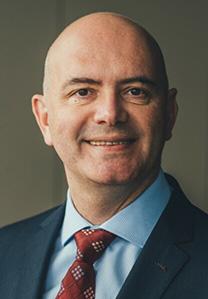
Capital-protected structured funds in Belgium had net assets of €2.9 billion at the end of June 2021, down by 8.7% from the previous quarter, according to figures released by the Belgian Asset Managers Association (Beama) on 15 October.
Since 2011, when assets stood at €19.2 billion, capital-protected funds have shown a downwards spiral, a trend reflected in issuance and sales figures for structured funds recorded in the SRP Belgium database.
Back then, 138 structured funds, from seven different providers (Axa, Bpost, Centea, Dexia, Fortis, ING and KBC), collected a combined volume of €2.6 billion. By contrast, in 2021 to date there have been just eight new funds worth €215m, with KBC the sole provider.
Capital-protected funds have been phasing out their commercialised
assets for some time now, according to Marc Van de Gucht (pictured), director general, Beama.
“The main reason is that the net repayments of capital-protected funds that reach their maturity are no longer sufficiently compensated by newly launched capital-protected funds,” said Van de Gucht.
“Due to the low interest rates, it is no longer attractive to develop such products because the fixed-income part of the portfolio that provides the capital protection takes too large a bite out of the entire portfolio – in other words, the scope for derivative products has become too small.”
KBC’s Perspective Global 95 USD 2, with sales of €42m during the subscription period, is the best-selling structured fund in Belgium in 2021, while of the maturing funds, E-commerce 90 USD 3, which sold €13.54m at inception, registered the best performance with a capital return of 160% after 5.75-years (8.55% pa).
The Belgian fund sector as a whole experienced a 5.3% increase quarter-onquarter during Q2 2021. Approximately 60% of the rise can be attributed to net
subscriptions and 40% to price increases of the underlying assets.
At the end of June, the total net assets of publicly distributed funds in Belgium amounted to a record €259.6 billion (end-March 2021: €246.6m). Net assets of equity funds increased by 8.4% to €87.5 billion during the quarter while within the category of mixed funds, pension savings funds increased by €900m to €24.2 billion in the period April – June 2021.
“Funds are a suitable long-term product to deal with inflation,” said Van de Gucht.
“See for example the long-term returns of pension savings funds that can reassure pension savers that they can maintain their future purchasing power.”
Since the end of 2019 (pre-Covid-19) and mid-2021, the Belgian fund market increased by €40 billion, according to Van de Gucht.
“Covid-19 had a strong impact during March/April 2020, but by the end of 2020 all price losses caused by the pandemic had been recovered. In other words, the Belgian fund sector has assimilated the Covid-19 pandemic relatively quickly,” Van de Gucht said.
Funds are a suitable long-term product to deal with inflation
7 www.structuredretailproducts.com NEWS | EUROPE SRPInsight
Vontobel delivers ESG-themes on correlated stocks in Italy
The structured products specialist is targeting Italian investors with a new range of certificates linked to ESG-themed sector baskets.

Vontobel has launched eight new Memory Cash Collect (Express) Certificates with the ‘Act ESG’ logo in Italy. The certificates are linked to thematic baskets comprised of stocks that are correlated – ranging from the gaming sector to the construction sector.
“We wanted to offer investors the option to invest in an ESG-related theme via structured products,” said Jacopo Fiaschini (pictured), head of flow products distribution Italy, Vontobel Digital Investing.
Vontobel created sector baskets for the certificates that are entirely composed of stocks of companies considered to be sustainable by its ESG Competence Center in Switzerland.
“The goal of the ESG Competence Center’s sustainability analysis is to identify companies that beat their competitors in an active sustainability approach and offer the best sustainability performance in their industry.
“This is the so-called ‘best in class’ approach,” said Fiaschini - all certificates are marked with Vontobel’s ‘Act ESG’ logo “to make them easily recognisable”.
Although the underlying baskets are linked to eight different sectors, the structure of the certificates is the same. They are issued on the same date with the same maturity and the same characteristics. The certificates have a step-down autocall trigger, deep barriers of up to 50%, and memory coupons of between 9.84% and 17.76% pa. The latter is offered via Memory Cash Collect (Express) Certificate on a basket comprising four shares from the renewable energy sector (Ballard Power Systems, Nordex, Siemens Energy, and Vestas).
organisations such as the United Nations Global Compact for corporate sustainability.
“We are committed to economic, environmental and social sustainability.
“If the product issuer is sustainable and the underlying is considered sustainable by our ESG Competence Center, then the final product is considered a sustainable product according to our ‘Act ESG’ methodology,” said Fiaschini.
All products are linked to worstof sector baskets of three or four stocks that are correlated
The story of ‘Act ESG’ goes back to 2019 when Vontobel conducted a survey across 4,600 investors from 14 different markets. Sixty-four percent of respondents said they did not receive enough information about ESG approaches. Amongst them only 17% had been offered concrete opportunities to save and invest in a sustainable manner.
“It became pretty clear that there was a lack of support and this was holding investors back, but at the same time we saw an interest and a trend towards sustainable investments,” said Fiaschini.
Vontobel then started taking the initiative to speak about the challenges ahead but also to show the historic transformation process that is creating unique opportunities for investors too.
“All products are linked to worst-of sector baskets of three or four stocks that are correlated. This is what we want to deliver to our Italian investors because low correlation is a risk component,” said Fiaschini.
The aim of the certificates is to promote Vontobel as an issuer of sustainable solutions. The company has been involved in sustainability since the 1990s and is a member of numerous
“Given this ESG knowledge gap, we wanted, and we still want to explain what investors need to know to play an active role in sustainable transformation for our economy,” said Fiaschini.
“The ‘Act ESG’ logo signals where the sustainable investing discussion is. You can see it on our website, in our publications…it is a symbol that is meant to guide investors on our platforms to identify relevant content.”
8 www.structuredretailproducts.com NEWS | EUROPE
BBVA QIS deploys cyber play
BBVA has added the Solactive BBVA Cybersecurity Index to its range of quantitative investment strategies (QIS).
The new technology index is comprised of equity stocks of companies helping to create a trusted and safe cyberspace companies in the frontline of digital security; data protection and cyber-risk insurance, as well as those creating secure online transaction platforms and heeding the call for cyber defense, thanks to the low-latency network infrastructure and components.
The Solactive BBVA Cybersecurity index is part of BBVA QIS’ strategy to offer its clients exposure to one of the most relevant megatrendstechnological disruption - and is a fully complementary strategy to the recently launched Solactive BBVA Next Generation Networks index, according to Javier Enrile Mora-Figueroa, head of QIS sales at BBVA.
“Hyperconnectivity is an already visible future, but not without threats,” he said. “Companies, governments and individuals are constantly exposed to cyber-attacks, and the cost is growing steadily. The Solactive BBVA Cybersecurity index strategy is based on the strong growth in the demand for cybersecurity services expected in the near future, due to the increasing frequency and sophistication of cyberattacks, regulatory pressure across the board and the IOT expansion, which calls for another added level of cybersecurity.”
The top components of the index include Oracle (5.54%), Microsoft (5.11%), Adyen (4.39%), Paypal (4.22%), Lockheed Martin (4.18%), Chubb (3.63%), Fiserv (3.57%), Analog Devices (3.53%), Fidelity National Information Services (3.44%), and Palo Alto Networks (3.43%).
The new underlying is available now for direct investment and distribution through structured products.
Unicredit joins Spire multidealer platform
The Spire programme allows repackaged notes arranged by the platform’s dealermembers to be issued in standardised formats. Investors can gain exposure to a variety of underlying collateral assets and customisable payoffs.
The platform has transacted in excess of €38 billion-equivalent of repackaged securities issued to major UK, European and Asian institutional investors to date.
‘Complementary to our existing suite of repackaging solutions, we see the Spire platform providing additional choice and benefits that address some of the needs of our institutional client franchise,’ said Amit Sharma, Unicredit’s global head of markets structuring & solutions.
Unicredit is seeking to adapt and upgrade its product platform ‘in line with the evolving needs and preferences of institutional investors, particularly those in the European pension and insurance sector’, according to Guido Filippa, global head of institutional distribution and private investor products at Unicredit.
The Spire platform was established by BNP Paribas, Citigroup, Credit Suisse and J.P. Morgan in May 2017. Barclays, Goldman Sachs, Crédit Agricole CIB and Morgan Stanley joined in 2018. Natixis, BofA Securities Europe SA, Deutsche Bank, HSBC, Société Générale and NatWest Markets joined in 2019. Nomura joined in 2021.
Morningstar introduces EU climate indexes

Morningstar Indexes has rolled out the Morningstar EU Climate Indexes to help investors progress toward meeting EU Climate Transition Benchmarks (CTB) and Paris-Aligned Benchmarks (PAB) requirements.
This new climate index series from Morningstar allows investors to target companies within a broad market index that are on track for decarbonisation in line with Paris accord targets, while minimising tracking error against the parent index. The series combines Morningstar core benchmarks with carbon emissions data and Carbon Risk Ratings from Sustainalytics, a Morningstar company and leading global provider of ESG research, ratings and data.
This new climate index suite from Morningstar adds to its growing investment in market indexes and data to support global investors.
In September, Morningstar announced the acquisition of Moorgate Benchmarks, a Europe-based global provider of index design, calculation, and administration, appointing Moorgate Benchmarks CEO Tobias Sproehnle as head of Morningstar Indexes in Europe reporting to Ron Bundy, president of Morningstar Indexes.
9 www.structuredretailproducts.com NEWS | EUROPE SRPInsight
US insurers ride the indexed annuity wave as FIA demand intensifies
The Secure Retirement Institute (SRI) has recorded a 14% increase in the sales of fixed indexed annuities during the first nine months of 2021 with figures totalling US$47.1 billion, compared with the same period of 2020.
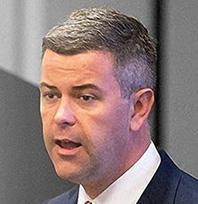
The renewed interest in FIAs comes as the interest rate environment slowly recovers and lower volatility is redirecting investor attention towards such products.
As the attention towards indexed annuities heats up, several market players are toying with custom and proprietary strategies to churn out newer alternatives to the market.
Independent FIA designer Annexus recently introduced an FIA in partnership with North American Life which tracks a Goldman Sachs managed prop index.
To respond to the increasing demand, the firm has placed a higher focus on index driven insurance products which can range from indexed annuities as well as the registered market with the broker-dealers in conjunction with its partners.
The indexed universal life market is also a priority for Annexus as well taking well developed index strategies with upside participation in a life marketplace. The firm introduced a retirement solutions division to employ a lifetime income builder, which aims to drive better outcomes in target
date funds for the defined contribution by embedding a fixed index annuity structure, according to Tom Haines (pictured), head of index solutions at Annexus.
“We also launched a Rila product last year called the Nationwide Defined Protection annuity, which is one of the first to use a floored structure in the Rila market to provide smart beta exposure. What we think is that the offering provides opportunities to define the level of risk, which is the floor, while providing upside to a well diverse group of smart beta indices,” said Haines.
The shift towards index-based solutions is driven by the fact that these products provide better hedging efficiency for its insurance company partners that results in better outcomes for clients.
Some index sponsors try to over engineer the design
However, as the scope of how sophisticated these products can become is further explored, the underying index itself may fall victim to unnecessary and decorative measures, according to Haines.
“Some index sponsors try to over engineer the design to make the index look sophisticated in order to achieve a better
illustration, but we are willing to potentially partner with index sponsors that develop more sophisticated and innovative indices if they are sincerely seeking to implement the latest academic advancements using robust methods in order to improve the likelihood that the index can perform on a go-forward basis,” he said.
In terms of thematic plays, it is questionable if this area is going to be as concentrated and sector based as apart from ESG, it is rare that other thematics that would resonate with the US retirement market, according to Haines.
“It will be interesting to see this play out. I do think people will continue to use strategies that look at new methods and computing power to drive better outcomes,” he said, stressing the importance of bringing lifetime income solutions within the defined contribution market in the 401k market and that such concepts that utilize lifetime income solutions raises the need for having an indexed annuity within a portfolio.
“Considering where markets are right now, the S&P 500 is back at all-time highs, interest rates are below 2% while the expected returns for major US-based asset classes is dim. So, I think it really reiterated that clients need to have alternatives for their portfolio in 2022.”
According to SRI, FIA sales grew by 30% in the second quarter of 2021 to US$17.1 billion, marking the highest quarterly sales in two years.
SRI also noted that registered index-linked annuity (Rila) sales were US$9.2 billion, up 47% from third quarter of 2020. For the first three quarters of 2021, Rila sales were US$28.4 billion, representing an 81% increase from the prior year.
10 www.structuredretailproducts.com NEWS: AMERICAS
SEC slaps enforcement action on oil ETP for neglicence despite no investor loss
The US regulator has charged the United States Oil (USO) Fund, an exchangetraded product (ETP), as well as its general partner United States Commodity Funds (USCF) for misleading statements about limitations imposed by its sole futures commission merchant and broker.
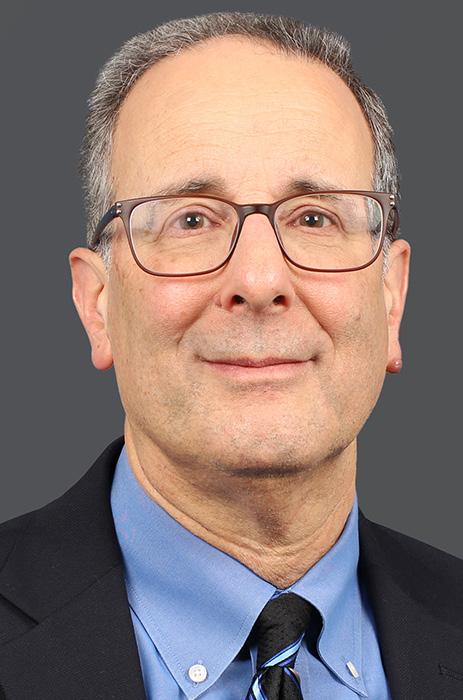
Both the USO and USCF have agreed to pay US$2.5m in penalties to settle cases by the SEC and Commodity Futures Trading Commission (CFTC). According to the SEC’s order, USO’s investment objective was to track any changes in the spot price of oil, as measured by the changes in prices of certain oil futures contracts.
However, oil market spiralled into turmoil during the market crash of April 2020 and the near-month futures contract closed at a negative price. The fund’s sole futures broker then told USO it would not execute any new oil futures positions for it.
As a result of this limitation, USO was restricted from investing the proceeds generated by the future sales of newly
created shares in oil future contracts. This brought about the risk that USO would not be able to meet its stated investment goal and the order states that the fund did not fully disclose the character and nature of the limitation until one month after the limit was first imposed.
On 20 April 2020, USO filed a Form 8-K announcing that it anticipated exhausting its existing inventory of available shares, and separately filed a registration statement on Form S-3 with the SEC. This registration statement would then go on to be amended several times and finally declared effective in June of 2020.
The SEC’s order also found that both USO and USCF have violated a negligence-based anti-fraud provision (Section 17) of the federal securities code. Neither party admitted to nor denied the allegations made by the watchdog and agreed to cease-anddesist orders and to pay the penalty, which will be offset by up to US$1.25m paid in CFTC’s parallel proceeding. According to Brad Berman (pictured),
counsel at law firm Mayer Brown, this enforcement by the SEC is different from other cases involving ETPs because no losses by retail investors have been mentioned.
“The fund was out of shares which led to USO filing a new registration statement. So, there were no offers of sales during the whole time this was going on and investors were just holding for the time being,” he said.
In terms of securities laws, liability comes in connection with the offer and sale of a security, but there were no securities to sell until the corrected registration statement went effective, said Bergman.
“That’s why I believe the SEC had to pinpoint section 17, which was a negligence matter. They could have gone after them under other avenues if there had been damages. This is a cautionary tale to others as when you see the SEC going after somebody where there were no offers and sales or no allegations of damage or investor harm at all, that signals to them that they must take extra precautions.”
The fund was out of shares which led to USO filing a new registration statement
11 www.structuredretailproducts.com SRPInsight NEWS: AMERICAS
US insurance regulator concerned with Rila growth
The Federal Insurance Office (FIO), a division of the US Treasury Department, is now eyeing the swift traction of Rilas in the market after record sales over the past year have prompted much discussion over their trajectory.

In an annual report issued by the FIO in October 2021, the agency has expressed closely monitoring registered indexlinked annuities (Rilas) detailing that while they represent a small portion of variable annuity sales, life insurers have ‘significantly increased Rila sales over the past six quarters, particularly as compared to other variable annuity products’.
‘Investors driving Rila sales growth appear to be interested in capturing recent gains in equity markets and acquiring protection-focused products generally. Rila sales appear likely to continue to grow in light of ongoing life sector restructuring. FIO will continue to monitor Rila-related issues,’ said the report.
According to Tamiko Toland (pictured), annuities director at Cannex, it is unclear how intimately the FIO understands how insurers manage the risk on fixed indexed annuities (FIAs) or Rilas.
“One thing they share in common is the sophisticated use of financial engineering
and trading expertise in options strategies,” said Toland.
If the options strategy itself were to fail, the insurer is on the hook for the promise to the policyholder, regardless which structure it falls within, which distinguishes these products from structured notes.
“Rilas are going strong and the biggest risks for these products come from either a dramatic change in economic conditions that would make popular Rila structures less attractive or an unexpected regulatory change.”
In terms of potential interventions that could be made by the FIO, matters are still unclear as the FIO has not taken any action previously on concerns it has voiced.
According to the Secure Retirement Institute (SRI), Rila sales in the US increased to a record level of US$10.1 billion in the second quarter of 2021, a 122% jump from the same period a year prior.
During the first half of 2021, Rila sales stood at US$19.3 billion, 105% higher than the prior year.
Fixed indexed annuity sales also grew
by 28% in the second quarter to total US$15.4 billion. Year-to- date, FIA sales stand at US$28.9 billion, reflecting a slight increase of two percent from the same period of 2020.
Fixed annuity sales jumped by 27% to US$35.1 billion in the quarter. Year-to-date, total fixed annuity sales are at US$66.2 billion, 15% above the first half of 2020.
The growth in the Rila market over the past several years has been driven by a combination of two factors: current economic conditions - strong equity market and low interest rates, and expanding market participants, according to Todd Giesing, SRI assistant vice president and head of annuity research.
“Our research shows consumers’ desire for protected investment growth remains strong and Rilas are providing the most attractive option in a historically low interest rate environment,” he said.
“Over the past five years, Rila sales have quadrupled from $6.3 billion in 2016 to $24.1 billion. Several carriers, recognizing this market opportunity, have entered the market. In 2016, there were just a handful of companies in the Rila market. Today, there are 15 carriers offering Rilas.”
Investors driving Rila sales growth appear to be interested in capturing recent gains in equity markets
12 www.structuredretailproducts.com NEWS: AMERICAS
BNP Paribas to fund Latam non-profit via structured note sale proceeds
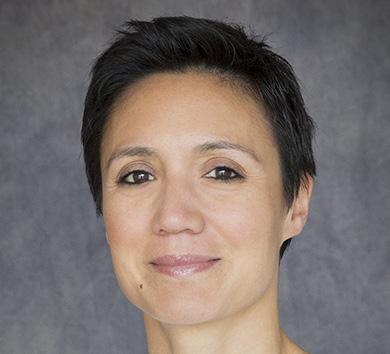
BNP Paribas USA has launched a philanthropic campaign to fund an independent non-profit organisation with donations from structured notes purchases.
The French bank’s new structured notes campaign will help The Forgotten International, an independent non-profit
organisation developing programmes to alleviate poverty.
The donations raised from the campaign will specifically benefit one of the organisation’s projects at La Comunidad de Niños Sagrada Familia, a large school, orphanage, and medical clinic in Peru, housing over 1,000 children.
BNP Paribas will donate to The Forgotten International a portion of the bank’s proceeds from structured notes sales.
The donation will fund the cost of a child’s daily meals for children housed at the orphanage for every $10,000 of structured products notes purchased by the bank’s clients, said Nathalie Texier-Guillot (pictured), BNP Paribas head of equity sales US.
Halo raises over US$100m in series C funding
Multi-issuer platforms continue to gain traction across markets as well as support from independent investors as suggested by the latest funding rounds.
The US structured notes platform has announced a collective investment backed by Owl Capital which includes the Mubadala-backed US$1 billion fund managed by Abu Dhabi Catalyst Partners, along with existing investors Allianz Life Ventures and William Blair.
The capital will be deployed ‘to invest in new markets, widen its distribution channels, and expand into new asset classes while further disrupting protective
investing’, according to Biju Kulathakal, co-founder & CEO of Halo.
Halo has expanded its offering over the past year with the addition of buffered ETFs and indexed annuities to its platform – the US platform has also onboarded more than 40 global banks and carriers.
Abu Dhabi Catalyst Partners was established in 2019 as a joint venture between Mubadala Investment Company and Falcon Edge Capital, to establish a strategic presence at Abu Dhabi
Global Market (ADGM). Halo aims to open an office at ADGM.
Cboe and MSCI expand partnership
Cboe Global Markets and MSCI have signed a licensing agreement that extends and broadens their strategic relationship.
The agreement builds on the collaboration between the two companies and extends Cboe’s rights to offer options trading on MSCI global indices through 2031. The agreement also expands Cboe’s and MSCI’s relationship, creating opportunities for the companies to work together to pursue other strategic initiatives across capital markets, and combine their complementary strengths and visions to help drive future innovation for market participants globally.
The two companies have collaborated to offer options trading on MSCI global indices for many years. Under the agreement, initially signed in 2014, Cboe will continue to have the rights in the US to develop and list index options on the following six MSCI indices: the MSCI EAFE Index (MXEA), MSCI Emerging Markets Index (MXEF), MSCI All Country World Index, MSCI USA Index, MSCI World Index and the MSCI ACWI ex-USA Index.
In addition, the agreement enables Cboe to offer index options, subject to regulatory approval, on four additional MSCI ESG indices: the MSCI Emerging Markets ESG Leaders Index, MSCI EAFE ESG Leaders Index, MSCI USA ESG Leaders Index and the MSCI World ESG Leaders Index.
Cboe is the only US exchange that offers options trading on MSCI indices. Cboe offers a series of BuyWrite and PutWrite strategy benchmark indices based on the MSCI EAFE Index and MSCI Emerging Markets Index.
13 www.structuredretailproducts.com SRPInsight NEWS: AMERICAS
NBC bolsters dividend investing as capital at risk displaces protection
The Canadian bank is expanding the pool of underlyings offered as its issuance of structured products returns to pre-pandemic levels.

SRP caught up with Vincent Marquis (pictured), managing director at National Bank of Canada (NBC) to discuss the bank’s structured product activity this year amid a rapidly changing landscape, which is garnering international attention in the form of German index provider Solactive.
Marquis speaks about the popularity of the dividend banking sector, the bank’s differentiating strategy in the Canadian structured products market, as well as the growing trend of non-principal protected note issuance which is now displacing guaranteed investment certificate (GIC) activity.
As reported in early September, structured products issuance at NBC has been strong this year.
“While the very early stage of the pandemic was challenging in 2020, it has since been a very good period for structured notes, especially income notes and auto callable coupon notes,” said Marquis. “We have seen the market
trending upwards, so we have witnessed more autocallable notes being called than in previous years.”
More people have begun to see that structured products offer a very powerful way of generating alternative income with some downside protection.
“The structured products team at NBC has been quite active and achieved a record number of notes and notional value,” said Marquis. “A main priority of our clients is income generation without taking too much risk, which is where structured notes find their niche in answering those needs. We offer multiple underlyings to cater to the diverse needs of our clients.”
The significant uptick in structured products tied to Solactive has not gone unnoticed. The German index provider offers broad market indices, but their sectoral indices have been more popular.
Dividends have been more stable in Canada historically, and sectors such as banking have been one of the most popular adjusted return indices used in the Canadian market.
“There’s a strong market sentiment that dividends from banks are going to increase and investing in an AR index provides investors with exposure to the dividend,” said Marquis. “I think it’s been quite popular, but the transition to AR has been executed very carefully. At NBC, we started with only one niche sectorial index. The idea was to attract the attention to the novelty and give us time to properly train our clients.”
During the third quarter, NBC issued a large volume of structured products to Solactive underlyings worth a collective US$243m accounting for almost 160 products. Most of the products are linked to the banking sector with the Solactive Canada Bank 30 AR index and Solactive United States Big Banks AR index dominating sales.
To support the shift, the bank has produced many training documents, put on webinars, and organised one-on-one discussions with its clients when they began showing interest upon the launch of these products.
“We then gradually rolled out other AR indices linked to sectors that are even more popular,” said Marquis.
A main priority of our clients is income generation without taking too much risk
14 www.structuredretailproducts.com NEWS: AMERICAS
Virtu’s RFQ-hub launches electronic workflow for swaptions on CDS

Virtu Financial has launches an electronic workflow tool for swaptions on CDS in its RFQ-hub, the firm’s bilateral multiasset and multi-dealer request for quote platform.
Union’s and Virtu’s RFQ-hub team collaborated to automate the traditional
voice and manual dominated swaptions on CDS workflow, a project which required the onboarding of sell side counterparties and technology integration with Union’s system architecture.
Using the RFQ-hub platform, swaptions traders can now leverage electronic request for quote workflows to put multiple liquidity providers in competition for efficient and transparent price discovery, automated audit trail and integration with risk management and other post-trade systems or processing.
German-based Union Investment, a European asset manager with €425 billion AUM, negotiated the first-fully electronic swaptions on CDS RFQ via Virtu’s RFQ-hub in H1 2021, which subsequently resulted in an OTC trade executed in that instrument.
Goldman offers SPAC-linked structured notes
Goldman Sachs Group has sold ‘a few structured notes’ to clients seeking to gain geared exposure to special purpose acquisition companies (SPACs), to capitalise on increasing activity on the market trend, SRP has learnt.
The two-year SPAC-linked structured notes offer a payout referenced to a basket of discounted SPACs and have been issued under the Rule 144A which provide many structured note offerings with exemption from the Financial Industry Regulatory Authority’s (Finra) Rule 5123, relating to private placements and the requirement for registered documentation.
It is understood Goldman does not charge a management fee for the notes but offers investors financing to participate in the product and keeps some of the returns on the SPAC stocks, depending on how well they perform. The new SPAC notes are being offered by a desk in the sales and trading arm of Goldman Sachs’ global markets division, rather than investment banking unit.
The SPAC market continues to grow at a speed – its size reached US$137.4 billion at the end of October.
Goldman Sachs declined to comment on the details of the product.
SIMON adds partner in push for marketplace expansion

The US multi-dealer platform has partnered with enterprise software solutions provider +Subscribe to launch an alternative investment fund marketplace, which would deliver a full suite of investment offerings from established asset managers.
The marketplace will be powered by +Subscribe’s electronic subscription document technology and strives to allow financial advisors to centralise their activity across direct fund and feeder fund investments.
The fund marketplace aims to equip clients with product analytics, education, and lifecycle management for both registered and private funds. It will also be available to more than 100,000 financial professionals from 50 wealth management firms that already have access to the Simon platform.
+Subscribe’s technology is employed on a global scale by more than 5,000 institutional investors, 1,200 private funds, and 300 service providers such as fund formation law firms, fund administrators, and asset custodians.
15 www.structuredretailproducts.com SRPInsight NEWS: AMERICAS
China Minsheng Bank cashes in on first QIS ESG play via structured deposits
Market players in South Korea reflect on the stagnating issuance of equitylinked securities (ELS) linked to ESG indices since their debut in April.
The new custom index, the Minsheng ESG Overseas Allocation Index (民生银行海外 ESG资产轮动指数), known as ‘MSMEGA’, is administered and hedged by Société Générale.
Following the first strike on 10 September, China Minsheng Bank (CMBC) has issued 12 tranches of the structured deposits with a bull call spread, five of which generated a US$28.3m notional while the remaining are CNY-denominated.
“ESG investment is gradually being favoured by mainstream overseas asset management institutions in the overseas market,” a CMBC spokesperson told SRP. “In China, the ‘carbon neutrality’ policy has received widespread attention since its introduction in 2020, but capitalguaranteed investment products featuring ESG theme are uncommon in the market.”
The commercial bank has developed the
‘Minsheng Bank ESG Index Series’ to be marketed via structured deposits, which shall be principal-protected at Chinese banks as required by regulations, to capture new opportunities.
“ESG theme is relatively new investment concepts for Chinese customers. As a result, we need to make more promotion efforts,” said the CMBC official.
Next in bank’s pipeline was the Minsheng ESG Global Allocation Index ( 民生银行全球ESG资产轮动指数), known as MSTARESG. The index constituents include another new proprietary ESG index offering Chinese banking exposure, the 民生银行行业龙头ESG 指数, in addition to the S&P 500 ESG Index and Eurostoxx 50 ESG Index seen in MSMEGA.
The structured deposits on the MSTRAESG is also based on a bull call spread with Citic Securities acting as
hedge providers for onshore and offshore assets, respectively. All three ESG indices are already live.
The MSMEGA and MSTRAESG are the first ESG-themed global multi-asset strategy indices independently developed by a Chinese commercial bank, as other ESG indices offered by Chinese banks refer to only one market or a single asset class.
UNDERLYING INDEX
The MSMEGA covers a total of six stock indices that meet ESG characteristics as well as government bonds in Japan, US and Europe including 10-year US treasury, long-term German treasury, 10-year Japan treasury, S&P 500 ESG Index, Eurostoxx 50 ESG Index and Nikkei 225 Index.
The rules-based momentum trading strategy aims to generate excess returns by increasing the weight of the relatively better-performing constituent while decreasing the other in the same country.
Bank of China International goes live with Horizon with Structured Products RFQ module
Electronic trading solutions and algorithmic technology, Horizon Software, has announced that the Bank of China International (BOCI) has chosen to go-live with its Structured Products RFQ Solution to maximise efficiency and deliver automated solutions to their clients.
The aim of this project is to provide BOCI with a system to receive, handle and monitor structured product RFQ requests that come in from clients via both email and messaging systems. As a result, the bank will be able to monitor the different RFQs, to price those RFQ requests using BOCI’s Numerix pricer, generate responses, and remove manual actions from sales traders.
By deploying the RFQ module, BOCI will be able to handle a larger volume of RFQs on vanilla ELN, accumulators, and range accrual notes and help to reduce the time required to respond to the individual needs of clients, according to Emmanuel Faure, head of sales Apac at Horizon Software.
Headquartered in Hong Kong with more than 50 subsidiaries around the world, BOCI provides clients with a full range of investment banking products and services in both mainland China and overseas capital markets, including share issuance, merger and acquisition, bond issuance, fixed income, private banking, private equity, global commodities, asset management, equity derivatives, and leveraged and structured financing.
16 www.structuredretailproducts.com NEWS | APAC
Hang Seng Bank debuts customised ELI with US equity underlyings
In a first for the Hong Kong market, Hang Seng Bank has introduced equitylinked investments (ELI) linked to US stocks for retail investors with a minimum ticket of HK$100,000 (US$12,861).
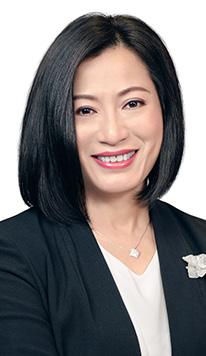
The new customisation tool, which went live on 18 October, allows ELI investors to select their preferred US stock underlyings, as well as the investment period from one to 11 months, strike price and airbag level. The subscription is available in seven currencies.
In the meantime, the Hong Kong-based bank will also issue ELIs tied to US stocks daily.
‘In fast-moving market conditions, investors are looking for more flexibility in building their investment strategies,’ said Rosita Lee (pictured), head of investment products and advisory business at Hang Seng Bank. ‘To meet the increasingly diverse needs of customers, we are continuing
to expand our range of wealth management product offerings and further strengthen our market analysis capabilities.
‘The launch of new subscription service will expand the range of choices available to retail customers with more sophisticated investment needs who are seeking to widen their investment scope and further diversifying their investment portfolios.’
Earlier this month, the Hong Kongheadquartered bank rolled out its US securities trading mobile service to ‘make it easier for customers to take advantage of investment opportunities in the US stock market’.
As a leading ELI issuer in Hong Kong SAR, Hang Seng Bank has marketed over 4,000 offerings in the first half of 2021 with a 30% increase in sales in 2020 compared with 2019, as SRP reported.
The underlying expansion is the issuer’s response to the surge in demand for US equity underlyings despite the dominance of Hong Kong stocks - Hang Seng Bank won three
awards at the SRP Apac Awards 2021 on the back of last year’s activities.
The 10 highest-selling ELIs last week were linked to the performance of single stocks including Meituan, Geely, Alibaba and Xiaomi, as well stock baskets covering AIA, China Merchants Bank, BYD, Bank of China (Hong Kong), Hong Kong Exchange and Clearings, Sino Biopharmaceutical, China Life, Xiaomi or Alibaba, according to the bank.
There are 925, 1,142 and 1,208 ELIs issued by Hang Seng Bank in the first, second and third quarter of 2021, respectively, SRP data shows. Majority of these reverse convertible or bonus enhancement notes are not capital-guaranteed, although the issuer offers ELI with 70% to 99.9% capital protection.
In 2020, ELI accounted for 57.8% of the structured product market in Hong Kong SAR, or HK$1.6 trillion, which includes equity-linked accumulators and decumulators, according to the latest survey from the Securities and Futures Commission (SFC) and the Hong Kong Monetary Authority (HKMA).
We are continuing to expand our range of wealth management product offerings
17 www.structuredretailproducts.com SRPInsight NEWS | APAC
HK equity bolsters Malaysia structured warrant market
The country’s structured warrants market saw a wider use of Hong Kong equity stocks during the last quarter.

The number of new structured warrants (SWs) listed on Bursa Malaysia has increased by 16.8% to 396 in Q3 21 quarter-on-quarter (QoQ) – the number of products listed stood at 1,088 in the first nine months, up 22% year-on-year (YoY) driven by ‘easy access to foreign underlying assets’.
Listing and issuer services revenue at the exchange increased by 10.9% to MYR17.9m QoQ ‘mainly due to higher initial listing fees earned from IPOs and structured warrant listings,’ according to Bursa Malaysia’s Q3 21 earnings release.
The exchange posted a revenue growth of MYR52.3m during the first three quarters of this year, up 30.5% YoY, while operating revenue rose by 6.5% to MYR590m YoY, which was partly attributed to the increased SW listings.
In September, the exchange embarked on a blockchain-powered proof-ofconcept to reduce the manual work for creating and managing securities certificates with an initial emphasis on SWs by leveraging ‘Daml smart contracts’ from Digital Asset and a distributed ledger platform from VMware.
‘The dematerialisation of structured warrants through a robust and automated distributed ledger technology will contribute to a more transparent, secure, economical, and most importantly, effective marketplace for all,’ said Datuk Muhamad Umar Swift (pictured), CEO of Bursa Malaysia.
STRUCTURED WARRANTS
The third quarter saw a significantly wider use of Hong Kong equities in structured warrants in Malaysia, which feature a tenor of less than one year.
Macquarie Capital Securities (Malaysia) remains well ahead as the top issuer in the market with 141 new SWs in Q3 21, or a 35.5% market share, followed by Malaysia’s AmBank (59), Kenanga Investment Bank (56), CIMB Bank (52), Maybank (48) and RHB Investment Bank (41).
The Australian securities house saw its quarterly issuance reach its peak this year – this quarter’s issuance comprised 108 call warrants and 33 put warrants, SRP data shows. The warrants featured the underlying assets of Hang Seng Index and Hang Seng Tech Index, which were tracked by 18 and 12 products, respectively.
Macquarie, which entered Malaysia’s structured warrant market back in 2014, is currently the sole issuer of Hang Seng Tech Index warrants.
Meituan Dianping, a Chinese shopping platform listed in Hong Kong SAR, also stood out as one of the preferred underlyings - its shares were tracked by three call and two put warrants during the quarter. This Hong Kong stock was first seen in the Malaysian SW market in September 2020 with RHB Bank as the issuer – the Meituan Dianping also appeared on a call warrant marketed by the bank in March.
The FTSE Bursa Malaysia KLCI Index, Hong Kong-listed BYD, S&P 500 and iShares FTSE A50 China Index ETF (HKD) were tracked by four new warrants each, SRP data shows.
In contrast, Malaysian stocks Genting Berhad and Top Gloves were part of the top five underlying assets in Q3 20 in Macquarie’s issuance, although the Hang Seng Index remained the most popular choice featuring across 18 products.
Along with Maybank, AmBank continued to focus on Malaysian equities - 59 new listings linked to a total of 56 stock names including Genting Berhad, Hartalega and Dagang NeXchange.
Kenanga Investment Bank in July used for the first time the Hang Seng Index – the index was first introduced to Malaysia’s structured warrant market by Macquarie in early 2017, SRP data shows.
The issuer eventually marketed six of HSIlinked warrants with a tenor of six months in Q3 21, making Hang Seng Index the most utilised underlying asset followed by Hong Seng Consolidated, a Malaysiabased investment holding company.
CIMB Bank, on its part, has been issuing Hang Seng Index warrants since April 2019 – 12 new listings on the index were added in Q3 21, SRP data shows.
RHB Investment Bank in September rolled over 10 new structured warrants on Chinese companies listed in Hong Kong with renewable energy as the main theme, including China Longyuan Power Group, Xinyi Solar Holdings and Ganfeng Lithium.
The Malaysian bank plans to list up to a total of 60 Hong Kong stock warrants from multiple sectors by the end of the year.
18 www.structuredretailproducts.com NEWS | APAC
Macquarie shifts to short-dated notes, balance continues to drop
The balance of structured notes at the Australian financial group has continuously dropped over the past five years, reaching AU$1.5 billion (US$1.1 billion) at the end of September, down 21.1% year-on-year (YoY).
The overall funded balance of structured notes saw a 42.3% decline compared with five years ago, according to Macquarie Group’s financial report of H1 FY22.
Approximately AU$1 billion of the funding came from Macquarie Bank, the main issuing entity of structured notes, while the remaining from Macquarie’s non-bank group.
The fall in activity resulted from the shift towards short-dated noted as the funding with a term of longer than five years decreased 36.4% to AU$700m as at 30 September YoY, or 56.3% lower compared to five years ago.
On a yearly basis, the funded balance of structured notes with a term of three to five years also slowed down while the balance of products with two to three year terms rose to AU$400m from AU$100m. There was additional AU$100m of funding with one to two year maturities.
In terms of newly issued structured notes, the volume was stable at AU$2.78 billion in the first half of FY22 YoY, 65.5% of which came from Macquarie Bank while the remaining from non-bank subsidiaries comprising Macquarie Capital and Macquarie Asset Management.
Under its US$5 billion Structured Note Program, the banking arm posted US$400m of outstanding funding from structured notes as of 30 September, which more than halved YoY. That outstanding volume was US$700m at the non-bank group, up 75% YoY.
The non-bank subsidiaries have been playing a greater role in issuing structured notes despite the bank’s dominance –their issuance amount climbed by 57.1% to AU$957m from April to September
YoY, translating to an eightfold growth compared with five years ago. Macquarie Bank comprises two segments - banking & financial services and commodities & global markets (CGM), which delivered net profit of AU$482m and AU$1.7 billion in H1 FY22, up 52% and 60% YoY, respectively.
Financial markets contributed to 32% of the net profit at CGM where equity derivatives and trading income fell mainly due to ‘lower equity derivatives presence in Emea’. However, the sub-division saw an increased activity providing solutions for corporate clients and posted reduced costs and expenses ‘due to platform restructure and lower trading volumes’.
In the meantime, Macquarie Asset Management derived net profit of AU$1.3 billion, which was up 23% YoY or a 29% increase compared with six months ago. Private and public investments accounted for 30% and 70% of the assets under
management at AU$735.5 billion with a concentration in Americas.
The other subsidiary of non-bank group, Macquarie Capital, posted net profit of AU$468m, down 44% YoY despite a growth from six months ago. As the issuer of listed structured warrants in Malaysia, it marketed 263 products from April to September featuring the underlying assets of Hang Seng Index, Hang Seng Tech Index and FTSE Bursa Malaysia KLCI Index, SRP data shows.
Macquarie Grou, which is led by Shemara Wikramanayake (pictured), reported that net operating income rose by 41% to AU$7.8 billion YoY, or an 8% increase compared with six months ago – coming from the Americas (39%), Australia (28%), Emea (26%) and Asia (7%). The net profit rose 107% to AU$2 billion in H1 FY22 YoY, representing a stable level compared with six months ago.
Macquarie Group: structured notes issuance

19 www.structuredretailproducts.com SRPInsight NEWS | APAC
Source: Macquarie Group’s interim reports
South Korea ELS issuance reaches new low – KSD
Sales of equity-linked securities (ELS) in South Korea continue to shrink despite a stable issuance.
The sales volume of equity-linked securities (ELS) fell by 20.5% to KRW10.8 trillion (US$9.3 billion) in the third quarter of 2021 quarter-on-quarter (QoQ), or a 32.7% climb year-on-year (YoY), according to the latest report from the Korea Securities Depository (KSD).
Meanwhile, 264 equity-linked bonds (ELBs) were sold at KRW7.8 trillion during the same period, down 75.4% QoQ or 54% lower YoY. The combined volume of ELS and ELB declined by 30.8% to KRW11.6 trillion in Q3 21 QoQ but represented a 17.8% rise YoY.
The top five issuers together accounted for KRW6.7 trillion during the quarter, or 58.5% of the ELS and ELB market share. KB Securities was the most active provider in the quarter with a market share of 12.1%, followed closely by Mirae Asset Securities, Samsung Securities, Korea Investment & Securities and Meritz Securities.
Public offerings represented 86% of the ELS and ELB market, while private placements continued the downward trend, which started two years ago, with sales falling by 12.7% to KRW1.62 trillion in Q3 21 QoQ, or 48.5% YoY.
In the meantime, the total outstanding balance declined by 0.4% to KRW53.1 trillion QoQ as the repayment amount fell 37.8% to KRW11.9 trillion during the same period. ELS and ELB contributed to 55.1% and 44.9% of the outstanding balance, respectively.
On a yearly basis, the outstanding balance and repayment amount dropped by 26.2% and 20.5% in Q3 21, respectively.
According to the KSD, more than KRW10 billion products knocked out during the last three-month period, down 35.7% QoQ. An additional KRW1.3 trillion was collected by investors upon maturity,
Hang Seng expands smart beta range
and the remaining KRW441 billion was interim payment.
ELS and ELB tracking the performance of the Hang Seng Index rebounded to KRW126 billion in Q3 21, up 50.9% QoQ despite having a small market share compared to other underlyings.
In contrast, the issuance volume across the S&P 500, Eurostoxx 50, Hang Seng China Enterprises Index (HSCEI), Kospi 200 and Nikkei 225 all declined. Among the main underlyings, the sales volume of Kopsi 200-linked products took the hardest hit, falling by 52.1% to KRW3.7 trillion QoQ.
Together there was KRW10.1 trillion worth of index-linked ELS and ELB issued in Q3 21, making up 87.1% of the market, while domestic and overseas stock underlyings contributed to KRW640.4 billion and KRW586.1 billion, respectively.
Hang Seng Indexes Company has expanded the Hang Seng Smart Beta Index Series with the addition of the Hang Seng Stock Connect China Smart Beta Single Factor Index Series.
Using the Hang Seng Stock Connect China 500 Index as the applicable universe, the Index Series is designed to capture exposure to six widely adopted factors – Value, Momentum, Quality, Yield, Low Volatility and Low Size – with a long-term risk premium.
In addition to providing enhanced exposure to the respective desired factors, the index series use a quality-based methodology that combines quality screening criteria that only includes stocks with top 80% quality scores and a tilting method that adjusts stock weightings by the factor strengths.
Empirical research by Hang Seng Indexes Company indicates that quality preservation is important in enhancing factor portfolio performance. The index provider offers two versions of each of the six single factor indexes, namely Select Indexes and Comprehensive Indexes.
The former are designed for a high-conviction approach to enhancing factor exposure, and the latter aim to provide a higher investment capacity. The Index Series is calculated and disseminated in real-time at two-second intervals.
20 www.structuredretailproducts.com NEWS | APAC
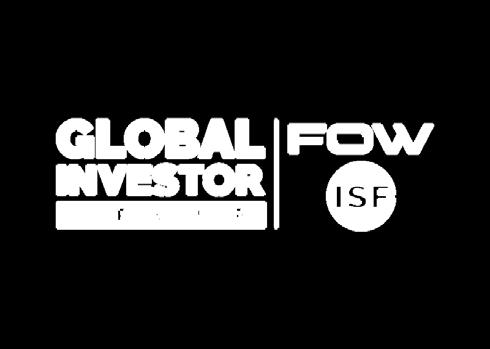
GLOBAL INVESTOR

A
GIG offers a wealth of news, analysis and data across the Asset Management, Securities Finance, Custody, Fund Services and Derivatives markets in print, online and in person at our global events
The Global Investor Group was created in 2017 bringing together three leading brands to provide unparalleled reach across the buy- and sell-side. Our mantra is to be the closest to each market we cover, through everything from breaking exclusive news stories to organising market leading events

Editorial

Events & Awards
Magazine
Survey and Study
Digital Advertising

SRPInsight NEWS | APAC
www.structuredretailproducts.com
Coverage CORE SERVICES ABOUT US
single source of in-depth news, insight and analysis. Connecting you and your expertise to all the key players in your markets, globally We offer various advertising options throughout our digital network and reach
GROUP
GLOBAL COVERAGE. LOCAL REACH.
Marex dispatches first
BITO-linked autocall
Marex Solutions has started quoting on the newly launched Proshares Bitcoin Strategy ETF, to expand its structured product offering linked to Bitcoin and Ethereum.

The non-banking issuer has launched the first ever autocallable note on BITO - the Proshares Bitcoin Strategy ETF. The Proshares Bitcoin Strategy ETF launched last week is the first-ever ETF in the USbacked by Bitcoin futures which is also the first ETF to reach the US$1bn mark in the shortest period of time.
The autocall on BITO has a six-month maturity, with a European barrier at 70% and a coupon of 35% pa.
“Pricing wise it looks very similar to Bitcoin itself,” Joost Burgerhout (pictured), head of Marex Financial Products, told SRP. “We continue to see a lot of demand on crypto linked products, such as autocalls and the cash & carry trade.
“With the launch of the Proshares Bitcoin Strategy ETF it was only natural for us to offer this ETF as a new underlying for our structured notes.”
We continue to see a lot of demand on crypto linked products
Marex Financial Products continues to be at the forefront of developments in the crypto market providing access to investors to the world of digital assets via traditional private banks.
SGX IEDGE LICENCES ITS BITCOIN INDEX
Singapore Exchange (SGX) has licensed its iEdge Bitcoin Index to Propine, the first Monetary Authority of Singapore (MAS)-licensed digital asset custodian and a Bitcoin ETF service provider.
SGX launched the iEdge Bitcoin Index in response to ‘strong market demand for best-in-class indices’ that track the price performance of Bitcoin and other digital assets. The index was developed in collaboration with UK-based digital asset market data provider CryptoCompare and has received strong interest from market stakeholders since its launch.
22 www.structuredretailproducts.com LATEST
“As enthusiasm in index-linked passive investing continues to grow, investors’ demand for access to emerging and big market themes in a low-cost and efficient manner is on the rise,” said Ng Kin Yee, head of data, connectivity and indices.
The partnership caters to the region’s asset managers and institutional investors interested in Bitcoin, according to Tuhina Singh, CEO of Propine.
Calculated by CryptoCompare using Volume Weighted Average Price (VWAP) aggregated from top rated exchanges, the two cryptocurrency indices aim to show the best price estimation for crypto traders and investors to value cryptocurrencies in their portfolio at any time.
The start-up declined to elaborate on its plans to launch the index-linked ETF.
FTSE RUSSELL LAUNCHES DIGITAL ASSET INDEX SERIES
FTSE Russell has launched three new digital asset indexes including the FTSE Bitcoin Index, the FTSE Ethereum Index and the FTSE Cardano Index.
The FTSE Digital Asset Index Series is designed to provide market participants with a mechanism to evaluate digital asset investments and prices.
The indices were developed in response to investor demand for benchmarks to accurately and methodically capture performance of digital assets, allowing for the more seamless integration into traditional portfolio analysis and processes, according to Kristen Mierzwa, Managing Director, ETP Strategy and Business Development, FTSE Russell.
‘FTSE Russell has developed a ground-up transparent methodology that starts with the accuracy of its pricing data, which is used to establish the building blocks for more comprehensive index inclusion,’ said Mierzwa.
‘At the heart of the index series methodology, mechanisms have been put in place to determine exchange and asset level eligibility. For digital assets, this vetting criteria is the cornerstone for reliable price and index data.’
The index provider is working to blend these new asset types into traditional financial thinking around research, trading, investment and monitoring, which requires that they work with existing structures.
Since 2018, FTSE Russell and Digital Asset Research (DAR) have worked to build a ‘robust’ framework and to align digital asset data with traditional investment infrastructure. Initially, the firms launched a suite of live, ticking indicative digital asset indices as a proof of concept.
The indices were developed in response to investor demand for benchmarks to accurately and methodically capture performance of digital assets
23 www.structuredretailproducts.com SRPInsight LATEST
BTC tracker superior to BITO, says Leonteq
The Swiss firm claims that using futures in a contango market can be a very costly exercise for investors

Leonteq is making a case for its tracker certificate on Bitcoin to be a superior trade compared to the recently launched ProShares Bitcoin Futures (BITO) ETF which went live on 19 October and raised US$1 billion in two days.
The Leonteq Bitcoin Tracker is based on the bitcoin spot price while the BITO ETF is based on a rolling bitcoin futures strategy using CME bitcoin futures. This strategy faces some challenges such as significant roll costs, and deleveraging in case of a contango market, according to the Swiss firm.
In addition, this kind of ETF strategy may not be fully allocated to bitcoin futures due to tax reasons and may invest part of the allocation to bitcoin related companies. This could become more of a proxy than a pure play.
CME bitcoin futures are trading in a contango market which means they are trading at a premium on the bitcoin spot
Constantly rolling CME bitcoin futures in
a contango market is a very costly exercise
price, said Tino Wendisch (pictured), head of crypto offering at Leonteq
“Constantly rolling CME bitcoin futures in a contango market is a very costly exercise as each roll comes with a reduced exposure. At maturity, the CME bitcoin future price converges with the bitcoin spot price, but the impact of the initial premium can be severe and is often underestimated,” he said.
For investors, this means the price of the subsequent future is more expensive than the one which they previously invested in.
“They will only be able to buy a smaller number of contracts – in other words, if they invest the same amount of money, the number of futures and therefore the participation will decrease,” said Wendisch.
The impact of the contango market over the last two years can be observed by comparing the performance of
24 www.structuredretailproducts.com FEATURE
Bitcoin Futures Contract Graph*

the Leonteq Bitcoin Tracker with the performance of the Horizons Bitcoin Front Month Rolling Futures Index ER - a futures strategy which replicates the rolling of front month CME bitcoin futures.
The Leonteq Bitcoin Tracker returned +562% while the Horizons Bitcoin Front Month Rolling Futures Index ER only gained +454%, resulting in an outperformance of 106% after fees, during the two-year timeframe.
“As live data shows, our certificate on Bitcoin outperformed a front month futures rolling strategy on Bitcoin by more than 100% due to the fact that our solution has no roll costs,” said Wendisch.
DECREASED PARTICIPATION
The impact on investors of the CME Bitcoin Futures trading in heavy contango can also be illustrated by the decrease in participation of the initial investment with this example, according to Wendisch.
LEONTEQ BTC TRACKERS
Leonteq is one of the pioneers in the crypto market – it launched its first products on Bitcoin in 2017, including the world’s first listed short tracker certificate on Bitcoin.
The firm broadened its offering in early 2018 with tracker certificates on Ether, Litecoin, Bitcoin Cash and Ripple as well as actively managed structures on single and multicrypto baskets such as the the Swissquote Multi Crypto Active Index. In September 2019, it launched the world’s first reverse convertible on bitcoin listed on Six Swiss Exchange,
Timeframe: 1 Nov 2019 - 5 Nov 2021
*The performance of the Leonteq Tracker is after fees while the Horizons Index is before fees
and in June 2021 the first publicly offered Ether-linked reverse convertible.
Most recently, the Swiss provider expanded its digital asset offering with the addition of 13 new crypto assets to its platform with new tracker certificates linked to the price of Aave, Algorand, Cardano, Chainlink, Cosmos, EOS, Ethereum Classic, Filecoin, Maker, Polkadot, Stellar, Tezos and Uniswap.
Leonteq reported in its half-year results at the end of July that its range of crypto products has seen a 15-fold increase in revenues (CHF9.2m/€8.4m).
Performance comparison: Leonteq Bitcoin Tracker vs Horizons Bitcoin Front Months Rolling Futures
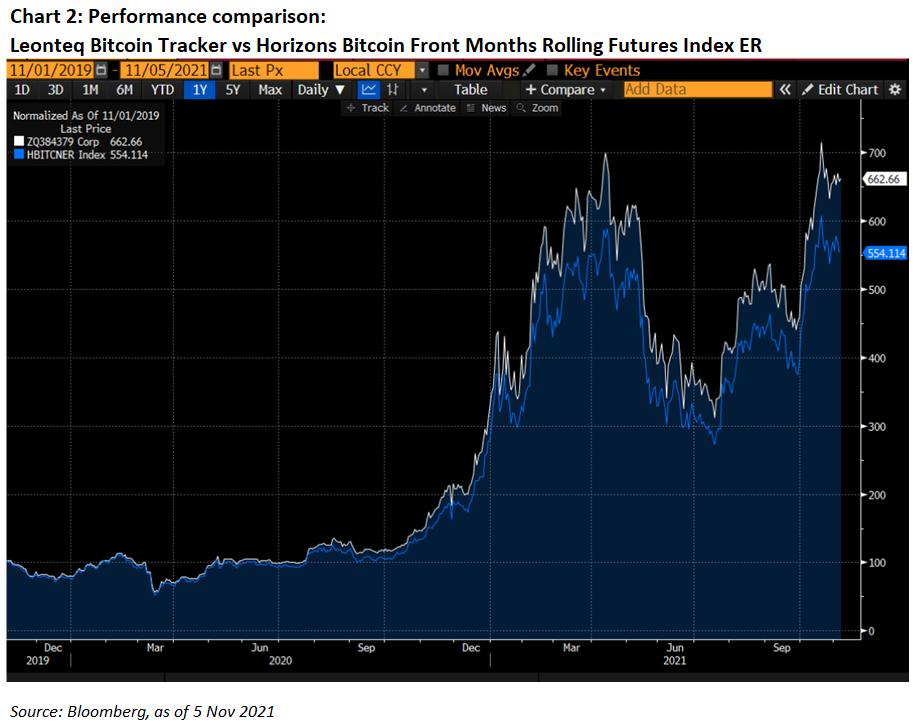
Source:
25 www.structuredretailproducts.com SRPInsight FEATURE
Source: Bloomberg, as 5 Nov 2021. The performance in the past does not constitute a guarantee for future performance
Bloomberg, as
5 Nov 2021
Instrument Identifier Performance in % Leonteq Tracker Certificate on Bitcoin CH0481487988 +562.66* Horizons Bitcoin Front Month Rolling Futures Index ER HBITCNER Index +464.11*
Morgan Stanley targets EU expansion with ‘solutions’ approach
The US bank is seeking to increase its presence and activities in Europe with a solutions proposition as opposed to a ‘factory’ set up.
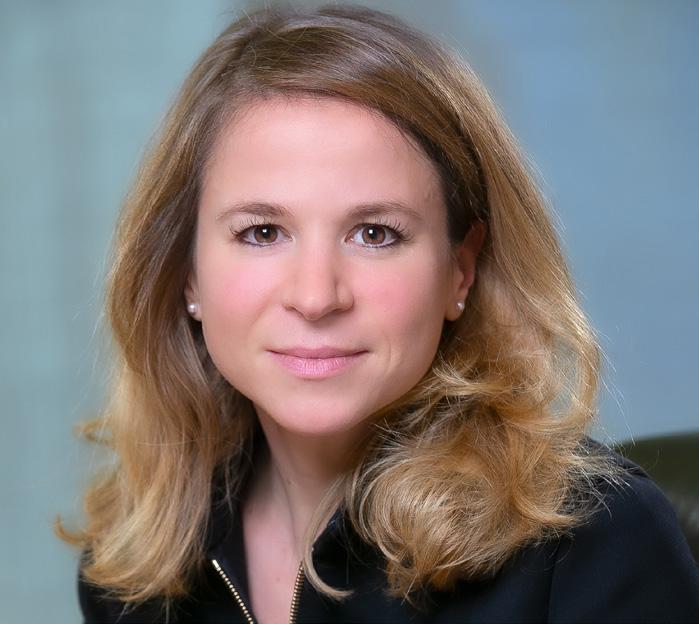
Morgan Stanley remains a top five issuer in the US market with more than US$9.5 billion sold to date this year across over 2,000 products. In Asia Pacific, the US bank is also among the top foreign issuers of structured products with almost 900 structures sold in 2021 worth US$3.2 billion. In Europe the bank has lost some ground over the last few years but remains an active player with more than 40,000 products marketed this year, mainly leverage & flow, worth US$800m.
After the appointment of Sam Losada as co-head of the global corporate equity solutions business at the end of 2020, the bank has bolstered its equity capital markets capabilities with the addition of several senior equity derivatives bankers in Europe and Apac.
SRP spoke to Clementine Declercq (pictured), executive director, institutional
France is one of the few countries in Europe where institutional clients are investing in structured notes for their own account
equity division, who has led the France structured products team since 2015, to discuss Morgan Stanley’s activities and plans as it enters a new expansion phase to increase its structured products footprint in the old continent.
“Morgan Stanley is a leading investment bank in equities and one area on which we have been increasingly focused is the equity derivatives franchise,” says Declerq, who added Belux and Switzerland to her portfolio of responsibilities recently. “[We] also have one of the highest credit ratings in the industry, which shows the strength of our business model and our resilience.”
In the structured products world, the bank is focused on increasing its footprint across markets and regions such as Belgium and Luxembourg.
“While we continue to build up our client offering in these countries, we also aim to
be even more active in their respective structured product industries, for example through joining bodies such as Belsipa this year, says Declerq, adding that the goal is to continue developing new ideas and opportunities for the bank’s clients in markets across Europe.
“France is one of our core markets in the region and we have a wide and diverse network of clients. It is one of the few countries in Europe where institutional clients are investing in structured notes for their own account.”
EVOLVING LANDSCAPE
As with any sharp market correction, new opportunities have arisen from the events following the breakout of the Covid pandemic – over the last few years a number of issuers have changed their strategy and moved to de-risk their structured products books, a trend that was accelerated after the market crash of 2020.
26 www.structuredretailproducts.com FEATURE
“The market has changed and the competitive landscape is narrowing in certain places,” says Declerq. “[This] is opening opportunities for other players to fill the gap. We believe this can help to build a healthier market with less concentration of risk and better diversification of credit exposure.”
Declerq points at the French market where the long-term autocall business has dominated most of the activity in recent years.
“[This] has brought with it risk to some trading books – and while it can be a healthy business if managed correctly, sudden drops in the market - as we saw last year – can make risk management quite challenging,” she says.
Although some of those players have been able to balance some of their risks through business with institutional clients, Declerq notes that another key trend in the market is the shift towards a reduction in the duration of products so the risk can be recycled faster.
“Traders prefer shorter maturities. The shortening of the investment term is also happening across the board now and as a result, we are seeing activity pick up in shorter maturity products (five to six years),” says Declerq.
OFFERING
From a product perspective, the US bank is among a group of issuers at the forefront of development trends in areas such as thematic indices.
“We recently developed several indices including one which tracks leading fintech companies. Other themes and sectors we have captured with our indices include healthcare and technology,” says Declerq.
“Sustainability has become a key driver of activity in the structured products market as well.”
One of Morgan Stanley’s most recent launches in this space is the Solactive ISS ESG Future of Plastic Index which is the result of the work of the equity derivatives unit with the MS Global Sustainable Finance (GSF) team.
The index provides a benchmark comprised of index of companies addressing the plastic waste issue with new practices and solutions. Starting with the Solactive GBS Developed Markets Large & Mid Cap Index universe, the Solactive ISS ESG Future of Plastic Index avoids companies with low liquidity, major environmental, social, or governance (ESG) risks, and companies with ties to products contributing to marine ecosystem degradation, such as microbeads or significant single-use plastic packaging.
The index is constructed by investing in the equally weighted basket of the 50 leaders stocks ranked at the top of a proprietary scoring methodology, and has been deployed across 32 products worth an estimated US$58m marketed in Ireland, Germany & Austria and Sweden.
“This was the first index we launched as part of our Plastic Waste resolution initiative, which was rolled out in 2019,” says Declerq. “Through this initiative, [the bank] has committed to tackling the growing global challenge of plastic waste in the environment.”
According to Declerq, by utilising the capital markets and partnering with its clients and employees, the initiative aims at preventing, reducing and removing 50 million metric tons of plastic waste from entering rivers, oceans, landscapes and landfills by 2030.
“We also began a collaboration with the National Geographic Society in January 2020, through which we are helping to finance several projects aimed at reducing plastic waste and ocean conservation.”
BEYOND AUTOCALLS
When it comes to structured products, Morgan Stanley has a solutions oriented approach than having a factory setup, working closely with its clients to ensure it delivers the best new ideas and alternatives to meet their investment goals.
“One of Morgan Stanley’s key strengths is how interconnected we are - our sales and structuring teams work closely to ensure we are delivering on our clients’
expectations,” says Declerq.
While autocallable structures still dominate the retail landscape across Europe, depending on the market, there are other options that may be of interest to investors.
“Recently we have seen more interest for twin win products from investors seeking protection because they had a view that the market was too high,” concludes Declerq. “The autocallable structure has also evolved to become smarter and you can see different variations and options around barrier levels and coupons which can offer a good investment proposition to the end investor.
“Conversely, the institutional market is slightly different, and you see more tailored bullet structures, without autocallability.”
YEAR TO DATE
Morgan Stanley has maintained its strong activity in the European structured products market in H1 21 bringing to market 141 non-flow products, according to SRP data.
The bank’s European activities were focused on France (103/US$407m), the UK (23/US$38m), and Italy (8/US$20m). In Germany, Morgan Stanley is a top 10 issuer of leverage products by issuance with more than half a million live products worth US$1.2 billion.
Across Europe, the most dominant underlyings for non-flow structured products issued by Morgan Stanley in H1 21 were TotalEnergies (21/US$64m), the Eurostoxx 50 index (17/US$147m), and the FTSE Custom 100 Synthetic 3.5% Fixed Dividend Index (16/US$21.8m). In the flow & leverage category, the US bank’s issuance is dominated by DAX-linked structures (78,273/US$183m), followed by the DAX/XDAX (24,193/US$55.6m) and Gold (19,362/US$43.3m).
Payoff types deployed by the bank in H1 21 include knock-out/autocalls (132/US$428m), reverse convertible (71/US$169m), protected tracker (61/ US$260m), and worst of option (61/ US$110m).
27 www.structuredretailproducts.com SRPInsight FEATURE
Spectrum Markets: every exchange is looking at crypto assets
It reached landmark in early October after trading one billion securitised derivatives on the platform since it launched nearly two years ago.

The growth has been driven by new users as well as increased trading activity, especially among younger traders, and those seeking to profit from higher levels of market volatility and a rapidly evolving macro and corporate landscape.
SRP spoke to the firm’s chief executive Nicky Maan (pictured) to discuss trends and growth opportunities following the expansion of its turbo range linked to indices, foreign exchange and commodities with a selected number of equities from Europe and the US.
“Demand and activity go wherever there’s volatility,” says Maan. “You see that in terms of demand for commodities, in the FX markets and different valuations of currencies, and you also start to see that some equities will come out in a very strong position, and others might be either in trouble or primed for recovery. This creates opportunity for investing.”
Where is the growth coming from for Spectrum Markets?
Demand and activity go wherever there’s volatility
Nicky Maan: The growth has been consistent over the past two years. Our strategy to take a pan European approach and enter all the key European markets at the same time has paid off. Generally speaking, there is an even spread across the different countries in Europe irrespective of the volatility periods.
In terms of our growth figures, we continue to see a month to month growth - we traded one billion turbo units recently which is consistent in terms of our expectations. For us, the next two years are going to be more important – it was expected to get where we are, having built a strong foundation which we have, but now it’s about widening out the profile of our products, creating a really complete offering for exchange traded products, and then having that feed into a distribution network throughout Europe to really increase the volume and grow the market.
What market are driving most of the activity and where do you see opportunity for growth and higher adoption of turbos?
Nicky Maan: Turbos have proved to be popular in Germany
28 www.structuredretailproducts.com FEATURE | Q&A
and Scandinavia, but we want to increase our footprint in other markets.
Spain is a perfect example of a market where we can grow our business. This product really isn’t very well known, it’s a new thing, so we have to educate for people to get familiar with exchange-traded products and innovate so that there’s an appeal for local investors to use our products.
Italy is also a key market for us - investors are familiar with exchange-traded products for the different types so we need to increase the profile of the turbo product which is not that different. We also want to develop similar types of products that are well known in Italy, and other markets to widen that base.
Do you see traditional stock exchanges as potential competitors? What are the differentiators?
Nicky Maan: We get asked that question a lot. We are different in the philosophy of why we exist. Spectrum was set up and exists for the benefit of the end retail clients and from that philosophy flows our offering and proposition, the technological features, the types of products, all the way through into existing 24 hours a day, and being pan European.
We only have 1,000 products on our exchange right now, over time we will expand this to maybe 100,000, but we are never going to have millions of different products on the venue. We aim to have a lean portfolio of the most popular products on underlyings that attract a lot of concentrated trading volume, we don’t want to have products lying around that nobody is using.
Our focus is the retail market. Traditional exchanges are huge, successful businesses, and they exist for lots of different reasons of which one is retail. For us, instead, it is just retail, and therefore from that intense focus, you then have several things that come out as a differentiator.
You can put a turbo on any underlying that makes sense, and cryptos is one of them - Nicky Maan
Is there scope to grow the underlying assets offered by turbos on the platform? Are you looking at cryptocurrencies?
Nicky Maan: There is an opportunity, of course. You can put a turbo on any underlying that makes sense, and cryptos is one of them. Every exchange now is looking at crypto assets. The key question there is not just launching the product but launching the product in a responsible and sustainable manner.
The last thing you want to do as an exchange is to launch a product, and then either run out of liquidity or must delist the product. You must consider many things (suitability, demand, liquidity, volatility, regulation…) before launching a product. It is
not always about first to launch the product but about doing it in a sustainable manner. But it is no surprise that we like every other exchange or product provider is looking at those asset classes rather than the others.
Are turbos suitable for buy and hold investors?
Nicky Maan: We are keen to offer the products that are going to be traded and linked to the assets that are traded all the time. We do not want to have extra products for no reason –just the leanest but most tradable set of instruments.
The other thing to remember is, there’s underlyings that you can play with, but there is also types and structures of products. The turbo structure lends itself very well for short term trading, if you want to hold it for a few hours, maybe a day or so, this is ideal for this type of trading strategy.
However, there are products that you want to hold for a few weeks, maybe something that you want to hold for a month, maybe even for years. We think there is room for different products to co-exist - our vision is to create a product suite where you have the most up to date traded underlyings (no more than 150-200 underlyings) but we need to be able to cater both ways across the underlying set, and also across the structure of products. And with that in mind, that is where we are looking to both on the underlying side and on the number of products, not necessarily increasing the number of lines.
What are the advantages of turbos versus other leverage products?
Nicky Maan: The turbo depends on which channel you are looking at it from, but it is very simple to understand. The investor simply buys a security that is created just on one asset class, it moves in a very linear direction in relation to that asset class. It can be traded in much smaller sizes as well, and it really fits with our retail perspective. We want to enable retail investors to trade in smaller tickets and have control of their trading experience.
If you are a large hedge fund probably makes sense to do an ETN or ETF perhaps - it is the purpose for which you are coming to the marketplace that determines everything around the offer.
Are you looking beyond Europe to grow the platform’s footprint?
Nicky Maan: We are part of the IG Group which is an international company – tapping other markets and jurisdictions have been always on the table from the start. But the sole focus for us over the next two years is on getting the model working in Europe with the additions that we have in the pipeline - product sets, underlyings, product types, where we want to scale the distribution, etc. Beyond that we can go elsewhere in the globe, but we are 100% focused on Europe for now.
29 www.structuredretailproducts.com SRPInsight FEATURE
CACIB: redemptions have triggered a huge amount of recycling
Following the recent launch of the first Paris Agreement aligned climate index in collaboration with MSCI, SRP spoke to Gael Riboulet, global head of structuring and sales, at CACIB to discuss the French bank’s activities in 2021 as it continues to grow its structured products business.

CACIB has already surpassed its issuance and sales in Europe with US$4.4 billion across 132 products sold in Europe, compared to 117 /US$4.3 billion recorded in 2020, and is currently the third most active issuer in Europe, according to SRP data.
The bank has had “quite an extraordinary year” in the structured products market on the back of the alignment of several factors since the Covid vaccine was rolled out at the beginning of 2021.
“The global vaccine rollout and relaxation of quarantine rules led to market recoveries which have balanced out our books after a difficult 2020 for the whole industry,” says Riboulet. “Many of the products on the market that were not called in 2020 were redeemed in 2021, and that triggered a huge amount of recycling that is still happening.
“We are continuing to develop our structured products franchise, beef up our setup, continue to grow the team and expand into new geographies and segments.”
The main trend seems to be ESG themed
CACIB has focused on capitalising on new opportunities that have risen this year on market movements to deliver products that offer added value to our clients and be relevant in terms of content.
Aside from increased activity and volumes, Riboulet’s team continues to build up and evolve its ESG offering as one of the pioneers in the space.
“The main trend seems to be ESG themed which can now be addressed through different dimensions,” he says. “We have observed a shift in the market with products switching from standard benchmarks to bespoke QIS strategies that embed some ESG features. This global trend took off about two years ago and already accounts for almost 50% of the business in some countries like France.”
As the environmental repercussions of investments becomes increasingly important for investors structured products provider have been forced to address the concerns of investors and the impact of their investments, as well as meet new regulatory requirements.
30 www.structuredretailproducts.com FEATURE | Q&A
“Regulation plays a vital role in the reorientation of capital towards sustainable investments and tackle current challenges concerning energy transition and carbon footprint reduction. Additionally, we must understand how EU Taxonomy defines ‘green’ products and secondly to align products with the EU’s requirements for Paris Aligned Benchmarks,” says Riboulet.
“We now have set EU regulations to comply with when selling products and indexes to achieve carbon neutrality by 2050.”
The bank’s new range of products, which are fully eligible for the European Paris-Aligned Benchmark label, has been well received by investors, in particular institutional clients, according to Riboulet.
However, to increase the adoption of these solutions by retail investors, some local regulators need to adapt their local rules of intelligibility and suitability to allow widespread distribution in their jurisdiction.
What developments would you highlight when it comes to ESG structured products?
Gael Riboulet: Sustainability in the equity market is not only about indices and underlyings. The main innovation that we have seen lately, which is also an area of focus for us, is the wrapper. Instead of issuing a standard note, we are providing green, social or sustainability-linked notes that comply with either ICMA’s green bond principles or social bonds principles. Through those wrappers, the proceeds of the notes are used to finance projects that have a positive ESG impact and that address some of our clients’ main concerns.
Additionally, we noticed an increasing interest in solidarity structured notes of which a percentage of the proceeds are donated to a humanitarian organisation. In this field, CFM Indosuez Wealth Management, collaborated with Crédit Agricole CIB, to create a solution contributing to energy transition and the preservation of the environment and that includes a donation to the Oceanographic Institute.
Do you think the overlapping and cross-over between new regulatory regimes such as SFDR, Mifid and Priips could jeopardise ESG adoption?
Gael Riboulet: A regulator’s challenge is to facilitate a market that permits a range of choices for investors, whilst at the same time protecting them through suitability checks and disclosure requirements. As with any industry, innovation is vital to bringing a diversified range of products to the market, therefore finding the right balance between regulation to protect investors and facilitating an environment that fosters innovation is important.
We have a dedicated team that ensures we are up to date on all the regulatory topics, to meet all the requirements once
the new rules come into effect - businesses where we are well positioned and where there are strategic opportunities for us such as ESG. The challenge for the industry will be to deliver figures and metrics under short notice and according to specifications that are not yet finalised.
Do you think there needs to be more clarity about the difference between risk v complexity among investors and regulators?
Gael Riboulet: From our point of view, it is important to find an equilibrium between risk and complexity. The suitability requirements are needed to make sure the investment products being sold are properly understood by the client and match their appetite for risk. On equities, structured products are often less risky than investing directly in equity markets even though they can be more complex.
With negative rates and the ongoing hunt for yield across markets and current risk aversion, protected equities could be a solution whereby we can achieve meaningful upside and mitigate drawdowns thanks to embedded permanent hedging strategies that provide efficient soft protection – a good example of a relevant product with less risk but more complexity.
What would you highlight in terms of innovation in the market?
Gael Riboulet: The focus continues to be on the underlying and the wrapper, not that much on the payoff which also continues to be dominated by auto calls. This structure has been successful because it has delivered good performance and returns to investors.
However, autocalls carry a risk both on the buy and sell sides, and that investors need to be aware of them and should mitigate the risk by diversifying their portfolio.
On the sell side, we saw last year how this risk can have a negative impact on trading books at times of sharp market corrections. Diversification can be achieved by serving different clients with different risk profiles, different products and different underlyings. To that extent, dividend and volatility risk can be mitigated when designing an underlying. For example, decrement indices allowed some diversification for the end clients with better pricing conditions.
Are platforms helping to grow the pie and promote structured products adoption in the buy-side?
Gael Riboulet: Multi-issuer platforms offering b2b connectivity have helped to streamline the issuance of products and is reducing the amount of admin work distributors must do, and so this has had a positive effect on the market and increased adoption. They are a good development for the industry because it allows a higher number of trades.
31 www.structuredretailproducts.com SRPInsight FEATURE | Q&A
Barclays: investors want proof of where the money is going and what projects are being supported
The UK bank is seeking to leverage a full ESG framework covering green bonds, sustainable underlyings and positive impact activities
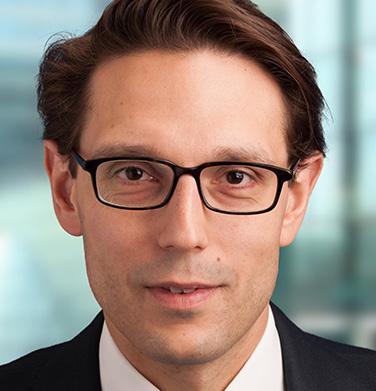
Barclays has recently closed a £400m green bond (on 27 October) to support climate-related products and initiatives, and has deployed its first in-house developed ESG underlying - the Solactive Climate Change Europe BTI PR Index - via a structured deposit sold by Causeway Securities in the UK market.
Despite slow adoption in the public space the UK bank has had very positive feedback on the index, and has done a number of privately paced trades since the Solactive climate change index went live at the beginning of the year.
The bank is seeking to provide a full framework since the initial focus on the ‘feel good factor’ sought through underlying exposure has evolved, and investors now want proof of where the money is going and what projects are being supported.
Distributors are willing to promote sustainable investing
“It is very interesting to see the evolution of the market, and how investors see ESG investing,” says Arnaud Heckenroth (pictured), head of equities structuring, Emea. “An increasing part of our client base, including wealth managers and structured products distributors, selling structured products linked to a green underlyings are being asked by their clients what happens with the notional invested, and if that notional can be invested in green projects.”
The new Green Structured Notes programme is part of the bank’s green bond offering as bonds will be used as a key building block of the bank’s structured notes offering.
“Distributors are willing to promote sustainable investing and they want to build an ESG green offering, but they need a framework in place that is fully accessible by clients,” says Heckenroth.
32 www.structuredretailproducts.com FEATURE | Q&A
“We think there is a market for green investments and we’re very keen to build a strong offering and position the bank in this space. The green structured notes programme is a key step into building our capabilities and offering clients a full suite of products covering all the ESG requirements – green bonds, ESG underlyings, and positive impact.”
Although most of the product issuance continues to relate to the ‘E’ in ESG, positive impact has become a way to bring scope beyond the environmental and green activities and the products offered by banks. In addition, investors are getting much more familiar with the two other factors at play - social and governance, and the industry is moving to respond to that demand, according to Heckenroth.
ROBUST PROCEDURES
The new programme will enable the bank to respond to the growing focus across players on best practice and develop its offering based on that premise whether it’s a green bond, an underlying or a note, according to Rupak Chandra, director of platform issuance development and marketing, at Barclays.
“We think it is important to have a robust and transparent issuance programme that is well understood by external investors and the market,” says Chandra. “You have to be very specific about the indices you bring to market and make sure clients understand specific process. For us, having a robust procedure and making this available on our website is key to being clear.”
‘Greenwashing’ and reputational risk are also at the forefront of the industry’s agenda with issuers and distributors seeking to uphold and promote new standards.
“We have a joined-up approach across the bank to ensure we’re coordinated,” says Chandra. “There is too much reputational risk
at play for the industry to take standards lightly - the market is learning and people are taking ESG very seriously.”
The data used to build new underlyings and the selection processes have also improved which is adding consistency and transparency to this part of the market.
“Data has become more relevant for investors and this is a very important aspect of our overall index offering – we have the market reach and the capabilities to design and build new strategies and we are committed to working with other parties, such as data providers and calculation agents, to make sure we use the right data to build those strategies,” says Chandra.
Underlyings will continue to play a pivotal role in the development and the evolution of the ESG structured products market. The first generation ESG indices which drove most of the activity over the last few years now been expanded with new filters and features such as risk control or synthetic dividend.
“Natural language processing and artificial intelligence are becoming more important to identify data sources and signals around very particular themes, and for algorithms to allocate within multi-asset strategies, according to Chandra.
“As the investment universe resizes with themes, it is more difficult to find the right data to invest, and technology is helping to bridge that gap,” he says.
Since 2015 Barclays has been an active underwriter of ESG bonds through its investment bank, underwriting more than US$40bn of deals. However, in the structured products market it is early days for the UK bank.
It is important to have a robust and transparent issuance programme
Barclays’ ESG issuance and sales to date amount to over US$500m across more than 13 products sold in the US, France, Portugal and the UK linked to indices such as the Stoxx Global ESG Leaders Select 50 EUR Index (US$23.51m); S&P EuroUSA 50 Low Carbon ESG Select Equal Weight 50 Point Decrement Index (US$176.11m); S&P EuroUSA 50 ESG Select Equal Weight 50 Point Decrement Index (US$156.90m); and MSCI Europe Countries ESG Select 50 Points Decrement Index (US$134.42m), as well as the Solactive Climate Change Europe BTI PR Index which raised US$2.70m.
“We already offer access to a wide ecosystem of traditional structured products,” concludes Heckenroth. “This is a starting point for us in that we want to build a full range of ESG and sustainable products to meet different needs and risk profiles.
“The new Green Structured Note Program has enabled us to expand our green and sustainable structured products offering and respond to increasing demand from institutional and retail investors with different ticket size products. The ideas we are putting forward are resonating with our clients which is an indication of the appetite out there.”
33 www.structuredretailproducts.com SRPInsight FEATURE | Q&A
SG Private Banking: HNW clients demand social impact
Jean-Christophe Jouannais, director, structured products engineer at Société Générale Private Banking (SGPB), talks to SRP about charitable products, the use of AMCs, and the partnership with MSCI.
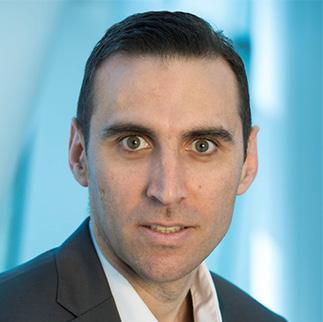
Four years ago, SGPB launched its first charitable structured product in collaboration with Société Générale Corporate and Investment Banking (SGCIB).
“This product collected more than €2 billion in notional, of which €4m was donated to charities and special projects,” said Jouannais (pictured).
The product, which was recognised by SRP in 2019 as ‘Deal of the year,’ was distributed in France, Luxembourg, Czech Republic and Monaco, and included a double donation mechanism with Société Générale paying an amount equal to 10bps of the initial investment to associated charities, plus a subsequent donation linked to performance - if a product autocalled after one year, it would provide a gift of 10bps, if it autocalled after two years, the gift would increase to 20bps, and so on.
“Some products autocalled two years after the launch, which meant we could increase the gift that we sent to charities,” said Jouannais.
Some products
autocalled two years after the launch, which meant we could increase the gift that we sent to charities
In 2020, the bank used the positive impact wrapper to support a number of projects in Africa, and since October this year it has used a new positive impact wrapper to support small companies in French regions with high rates of unemployment.
“The social element of the investment is very important, it is a key thematic for private banking clients – high-net-worth clients want to have a social impact,” said Jouannais.
Like most distributors in the autocall business, SGPB has benefited from the number of products that have autocalled due to the levels of the financial markets.
“The autocall is a blockbuster because clients are looking for yield due to the negative interest rates in Europe – it is the best alternative to propose to clients seeking regular yield,” said Jouannais.
During 2020, the bank observed an increased demand from clients looking to switch from an equity position to a structured
34 www.structuredretailproducts.com FEATURE | Q&A
product to monetise the volatility of the underlying, while since the start of the Covid 19 pandemic, ESG has become central to its clients, with the bank expanding its offering to meet this growing demand.
“There is a real change in appetite, and we have done many private placements with clients going for participation products with a protection barrier, with or without cap.
“Today, more than 50% of the products we distribute have a positive component – either a positive impact finance wrapper, an ESG underlying or a charitable component, and that number is increasing,” said Jouannais.
AMCS
Actively managed certificates (AMCs) have become an interesting vehicle for SGPB to deliver new investment ideas, according to Jouannais.
“AMCs are not used as a speculative trade to capitalise on the idea of the moment or to put together a basket of stocks, but to offer exposure to trends of the future, themes with a long timeframe,” said Jouannais.
“We can identify trends regarding a particular thematic, say hydrogen, and provide exposure via an AMC, which allows us to use our skills in terms of managing stocks that have emerged around the thematic and respond to demand.”
The AMC wrapper is enabling investors to invest in new thematics and to be more opportunistic.
“Because of our portfolio management expertise, we can marry the thematic with a product and actively manage the underlying of a passive investment – this is a simple example of innovation of leveraging structured products to respond to the need of the end-investor,” said Jouannais.
MSCI
SGPB has partnered with MSCI France to develop the MSCI France EMU Index – one of the first indices to be
offered in open architecture in a price friendly format for structured products.
“We can deliver the products,” said Jouannais. “We have the wrapper and the positive impact finance program to issue charitable products, and we wanted to partner with a recognised index provider that could accommodate our open architecture requirements to develop our range of products.”
Jouannais has seen an increase of indices co-created by different investment banks on the ESG thematic since the AMF in France, and the FSMA in Belgium, took the position that ESG filters are not a mechanism of complexity in the underlying of a product.
“The problem for us is that these custom indices are then monopolised by the investment banks – they have exclusivity to issue structured products on it, so you don’t benefit from counter pricing, and the trading capacity of different issuers,” said Jouannais.
One of the reasons why SGPB decided to develop its own index, is that many indices developed by investment banks are not fully in line with its conviction.
“Most of these indices exclude firearms and tobacco, but some do authorise gambling companies.
“Another reason is that benchmark indices are often designed for ETFs or delta-one products, and there are issues when you embed them in traditional participation products or autocalls, because there is an absence of liquidity or dividend, and long-term volatility,” said Jouannais.
The MSCI France EMU Index is not exclusive licensed to SGPB.
“We are happy that other players such as SGCIB, BNP, Barclays and Goldman have issued structured products on this index. We have also introduced a version with a fixed dividend, and will continue to develop new ideas,” Jouannais concluded.
AMCs are not used as a speculative trade to capitalise on the idea of the moment
35 www.structuredretailproducts.com SRPInsight FEATURE | Q&A
US market review: sales up by 34% YoY, Citi takes the lead
SRP looks at the most significant developments in the US structured products market during September 2021.

Some 2,633 structured products in the US worth US$8.6 billion had strike dates in September 2021, compared with 2,518 products worth US$8.2 billion, which had strike dates in August 2021. About 1,148 structured products have already matured in September 2021, valued at US$4.2 billion while 1,017 products matured in the previous month worth US$4.3 billion
Sales volumes from January to September 2021 have also increased by 34% from the same period a year prior while issuance also increased reaching 23,642 products from 19,321.
US sales and issuances for the month stand at 2,632 products worth US$7.8 billion, a 20% increase from sales totalling US$6.3 billion (2,273 products) in the same period a year prior.
ISSUERS
In terms of sales, the top US issuer group for September 2021 was Citi with a total of 369 structured products worth US$1.2 billion with a market share of 15.46%.
Trailing closely behind was Morgan Stanley with 286 products
36 www.structuredretailproducts.com EXPERT VIEW
Image: Steve Harvey/Unsplash
worth US$1.1 billion and a market share of 14.15%, along with J.P. Morgan with 452 products valued at US$1 billion with a market share of 12.76%, and Goldman Sachs with an issuance of 258 products worth US$883m and a market share of 11.26%.
In terms of product issuance, UBS issued the highest number of products (560) for September 2021 with a sales volume of US$616m and market share totalling 7.86%.
UBS collected multiple awards during the SRP Americas 2021 conference in September which included ‘Best yield enhancement distributor’ and ‘Best private bank’.
PAYOFFS
The knock-out payoff type gained the most traction during September 2021 with 1,594 products valued at US$4.5 billion and mostly featured alongside reverse convertible, callable and worst of option.
Reverse convertibles were also on demand during September featuring in 1,434 structured products worth US$3.9 billion. Digital structures saw the least traction during the period with just 78 products worth around US$490m.
UNDERLYINGS
Tesla appeared as the only single share underlying to appear on the top 10 ranking for September with 45 structured products worth US$128m.
Around 27 structured products linked to baskets of equity shares contained the stock of the electric car manufacturer with a sales volume of US$74m. The best-selling product linked to Tesla was the Autocallable Contingent Interest Barrier Notes - Worst of Option (89114TRG9).
Selling for US$10.5m, the income note will reach maturity in three years and tracks both Airbnb and Tesla. The product will offer a quarterly coupon of 20.11% pa if each underlying is greater than or equal to 65% of its respective initial level on the observation date.
The electric car manufacturer has risen in popularity over the past year with 414 products valued at US$1 billion being tied to Tesla in 2021 to-date.
Another dominant single share underlying in September was Apple which has accumulated 390 products worth US$1.4 billion during the year. However, the most dominant underlyings are single equity indices including the S&P 500 index with 195 products valued at US$1.1 billion, the Eurostoxx 50 with 40 products worth US$232m, and Russell 2000 with US$36 products valued at US$223m.
ASSET CLASS
Equities continue to dominate the rankings with index baskets collecting US$2.7 billion across 838 products during September. This signals a shift from the same period in 2020 in which single equity indices collected most of the sales - 450 products worth US$2 billion. In this time frame, index baskets accounted for 824 products with a sales figure of US$1.8 billion.
Exchange traded fund (ETFs) assets accrued 185 products with a sales volume of US$730m in September 2021, saw a 17% increase in sales compared to the same month in 2020 when 184 products were issued tied to ETFs worth US$603m.
In addition, hybrid structures collected US$347m on the back of 172 issuances, followed by interest rates with nine products worth US$52.9m, commodities with four products worth US$15m, and real estate with just one product worth US$0.4m.
The knock-out payoff type gained the most traction during September 2021 with 1,594 products valued at US$4.5 billion
37 www.structuredretailproducts.com SRPInsight EXPERT VIEW
Analysis: The Evergrande story
Chinese property development company Evergrande has frequently been in the financial press during most of 2021. Since it is also often used in structured products in Asian markets, it is of particular interest.

Evergrande is China’s second biggest property company and has been in trouble for at least two years due to its aggressive expansion plans and the associated debt burden. It is now thought to be the world’s most indebted company with US$300 billion in debt, a rather unwelcome title that means it deserves attention. As at the end of October 2021, its equity market capitalisation was only US$40bn, indicating the market is ascribing very little net worth to that debt.
The company was founded in 1996 and had always funded its growth through a large programme of high-yield bonds. Though initially successful it has continued to seek funding for a number of property deals and has also expanded into a number of other areas such as electric vehicles and investment in and development of a Chinese premier league football club. It remains a distant second to Country Garden (the largest Chinese property company) which is five times as large by market capitalisation.
Property development is a notoriously difficult business to be in as it is exposed to just about every possible risk. Political considerations, labour, planning, taxes, interest rates and currency movements are all factors that determine profitability. The real estate market is subject to unpredictable long-term movement, and crucially the lead time in property development makes it very difficult predicted revenue with costs. There have been many examples of real estate failures and problems, such as the bankruptcy that affected the development of London’s Canary Wharf in the 1990s and the severe real estate crisis in Ireland in 2008.
Evergrande has been struggling to service its high debt levels and made warnings to the market that it may delay or miss coupon payments. The most recent warning came in late September.
A portfolio approach of proper diversification and astute timing is needed to stand a realistic chance of success.
38 www.structuredretailproducts.com EXPERT VIEW
Consequently, Evergrande bonds are now trading at 20%30% of par for short to medium term debt indicating a very distressed position. This is even less than the 40% level that is normally taken to be the average recovery rate once a company has defaulted. The global slowdown of the last two years due to the pandemic has exacerbated the problems that Evergrande faces, with poorer business prospects, reduced property valuations, and a tightening of liquidity in the market.
The reason that Evergrande’s troubles have become such big news is because the worry of a knock-on effect for companies that are exposed to its debt or reliant on it for business. Because Evergrande had the most corporate debt in the world it would be a very big event for them to default and would have a knock-on effect on both bond and equity markets in Asia and beyond.
Indeed, the early part of the week of 20 September 2021 saw a three percent fall in the S&P 500 mostly as a result of concerns of Evergrande. If this company were to default it would also act as a further dent in confidence of the China economic story. Such an outcome has been compared to some to the bankruptcy of the investment bank Lehman Brothers in 2008 because of the nature of the failure and the ability to affect other companies and markets. While Evergrande’s default would be a serious event it is hard to see it having anything like the same impact, due in part to the various market protections put in place post Lehman.
PRODUCT EXPOSURE
Since the start of 2021, the Hang Seng China Enterprise Index (HSCEI) has fallen 17%, while Evergrande has fallen a staggering 83%, to be at one sixth of its level in January. By comparison, Country Garden has fallen by 32% which is also significantly more than the HSCEI. Its fall is partly in consequence to the fate of Evergrande and a re-rating of
the sector. Evergrande’s stock price volatility this year has been over 70%, also dwarfing Country Garden at 38% and the HSCEI at 24%.
Evergrande has featured in baskets in capital protected products in South Korea alongside companies like Tencent Holdings (technology) BYD (manufacturing) and Sands China (resort developer and operator). Such products if fully capitalprotected would help avoid losses due to the dramatic falls in Evergrande. Currently there are five live products in South Korea, according to the SRP website.
In Hong Kong, Evergrande has been used more frequently and appears as the underlying in 65 live products. Here the typical construction is Evergrande stock only as the underlying, capital at risk and shorter maturity. Examples include three-month and six-month reverse convertibles with very high coupons, 3.72% per month on the threemonth (equivalent to 44.64% pa) and 2.89% per month on the six-month (34.68% annualised). Both products can be called early, and feature 50% American barriers with a strike level around 85%.
The three-month product example has just matured with the stock going through its barrier and consequently losing nearly 50% of investor’s capital. For a stock to fall below a 50% barrier in three months demonstrates high volatility played out with a large fall. Anyone investing in short dated single stock reverse convertibles needs to think of them as equity investments with some protection, rather than an investment which can just lose capital. A portfolio approach of proper diversification and astute timing is needed to stand a realistic chance of success. Communicating this to retail investors remains challenging and subject to a high level of regulatory scrutiny.
The Evergrande story will continue to dominate the headlines and underlines the importance of asset allocation in investing in structured products or directly.
Property development is a notoriously difficult business to be in as it is exposed to just about every possible risk
39 www.structuredretailproducts.com SRPInsight EXPERT VIEW
Product wrap: Citi offers access to US decrement trio
In this month’s wrap, we look at a selection of structured products with strike dates between 17 October and 13 November 2021
EUROPE
Deutsche Bank collected US$4.8m with Fund Opportunity USD 2028 in Belgium. The eight-year medium-term note (MTN) participates 100% in the rise of Acatis Gane Value Event Fund, capped at 37%. The underlying mutual fund tracks two benchmark indices: 50% Eonia TR (EUR) and 50% MSCI World GDR (EUR). Barclays Bank is the issuer. The product is listed in Luxembourg, although it does not provide access to an active market. Total costs of maximum 6.50% are included in the issue price of 102%. Priips Summary Risk Indicator (SRI): two out of seven.
Hedios collaborated with BNP Paribas for the launch of H Performance 40 in France. The 12-year Athena autocall is subject to annual early redemption if the underlying S&P Euro 50 Equal Weight Synthetic 5% Price Index closes at or above 110% of its initial level. If the knockout is triggered, the product offers a bonus coupon of 40%, plus a coupon of three percent
for each year elapsed. The product has a soft capital protection barrier of 30% and is listed on the Luxembourg Stock Exchange. Priips Summary Risk Indicator (SRI): four out of seven.
Leonteq issued a classic express certificate on the shares of Bayer, Enel, and Intesa Sanpaolo in Italy. If, after one month of investment, none of the shares have fallen below 65% of their respective starting levels, investors receive a one-off welcome coupon of 15%. The product also has a knockout feature, which is triggered if all three shares close at or above their strike levels on the annual valuation date. In that case it offers 100% capital return, plus a coupon of five percent for each year that has passed. The product can be traded on the multilateral trading facility (MTF) EuroTLX. Priips SRI: five out of seven.
Volksbank Zuffenhausen celebrated its 100th anniversary with the launch of 100 Jahre VBZ Jubiläumszertifikat in Germany. The three-year product pays a memory coupon of 4.30% pa if the share of Daimler closes at or above 75% of its starting price. It also has step-down autocall feature, which starts at 100% for year one and subsequently decreases to 95%
40 www.structuredretailproducts.com PRODUCT WRAP
0 50 100 150 200 250 Goldman Sachs Credit Suisse DZ Bank BNP Paribas
Générale Unicredit Leonteq Landesbank Baden-Württemberg
*Excluding flow- and leverage products Source: StructuredRetailProducts.com
Société
Vontobel Deka Bank Europe: top 10 issuer group by issuance - 17 October to 13 November 2021*
in year two. DZ Bank is the issuer. A one-off entrance fee of 4.48% applies. The product can be traded on the exchanges of Frankfurt and Stuttgart. Priips SRI: five out of seven.
Bank Millennium marketed Potencjał Szwajcarii II in Poland. The three-year deposit is linked to the Swiss Market Index (SMI). It features the shark fin payoff mechanism and investors participate 40% in the rise of the index, providing it does not reach or exceed 160% of its starting price at any time during the investment period. The maximum capital return is set at 123.99%. Priips SRI: three out of seven.
Pohjola Pankki targeted its OP SijoitusPlus Kultayhtiöt XII/2021 at retail investors in Finland. The five-year medium-term note (MTN) tracks the Solactive Gold Miners Decrement 4% Index. If, at maturity, the index performance is positive, the product offers 150% uncapped participation in the rise. Otherwise, the investor participates 100% in the fall, subject to an overall minimum capital return of 75%. The product is not listed. There is a structuring cost of maximum 5.08% (0.99% pa). Priips SRI: three out of seven.
Meteor Asset Management distributed a quarterly conditional income plan on the FTSE Custom 150 Equally Weighted Discounted Return Index in the UK. The 10-year Phoenix autocall will pay a gross income of 1.50% for a quarter if the closing level of the index is at least 85% of its opening level on the valuation date. From year two, the plan redeems early if the index closes at or above its initial level. The barrier for soft capital protection at maturity is set at 65%. The product is issued via Natixis Structured Issuance while Natixis acts as the guarantor. BNP Paribas Securities Services is the
custodian. Meteor will receive a distribution fee of up to 1.75%. The plan is listed on the London Stock Exchange. Priips SRI: four out of seven.
NORTH AMERICA
Bank of Montreal issued series 44 of its principal protected deposit notes in Canada. The seven-year securities participate 100% in the rise of the S&P 500 Daily Risk Control 7.5% Index, which relies on the S&P 500 methodology and overlays mathematical algorithms to maintain specific volatility targets.
Goldman Sachs Private Banking achieved sales of US$7.9m with its Capped Leveraged Notes on the Eurostoxx Banks Index in the US. The 1.26-year registered note offers 300% participation in the rise of the index, capped at an overall maximum return of 136.75%. If the index performance is negative, the investor participates 1:1 in the fall. UBS is the issuer. The estimated initial value of the notes is US$984.00 per US$1,000 face amount. A commission of 1.25% applies.
Also in the US, Citigroup Global Markets issued callable contingent coupon securities on a worst-of basket of three decrement indices. The five-year product offers a quarterly coupon of eight percent pa if the Nasdaq 100 Total Return 2% Decrement Index, Russell 2000 2% Decrement Index, and S&P 500 3% Decrement TR Index all close above 70% of their initial level on the valuation date. The estimated value is US$850 and there is an underwriting fee of 0.50%.
Americas: top 10 issuer group by issuance - 17 October to 13 November 2021*
41 www.structuredretailproducts.com SRPInsight PRODUCT WRAP
0 50 100 150 200 250 300 350 BBVA Credit Suisse Barclays BMO Financial Monex
Stanley Citi
Sachs
UBS
Morgan
Goldman
J.P. Morgan
Source: StructuredRetailProducts.com
*Excluding flow- and leverage products
Asia Pacific: top 10 issuer group by issuance - 17 October to 13 November 2021*
Samsung Securities HSBC
Bank of China
Shinhan Financial Group
KB Financial Group
Korea Investment
Hana Financial Group
Meritz Securities
Nonghyup
Bank of East Asia
*Excluding flow- and leverage products
LATIN AMERICA
Monex sold MXN231m (US$11.2m) worth of range accrual notes linked to the appreciation of the US dollar relative to the Mexican peso. At maturity, the product offers a capital return of 100%, plus 0.5% pa prorated for the number of business days in the investment period when the USD/MXN is within the range of 20.29..20.37].
BTG Pactual distributed a three-year certificate of deposit on the US Innovative Leaders 5 Index in Brazil. At maturity, the product offers minimum 100% capital return, plus 500% uncapped participation in the rise of the index. BNP Paribas is the issuer.
MIDDLE EAST & AFRICA
Standard Bank launched Capped Protected Index RESI 10 95/24m in South Africa. The two-year MTN is linked to the FTSE/JSE Resources 10 Index, which consists of the 10 largest companies ranked by investable market capitalisation in the South African resources sector, defined as the combination of the energy and basic materials industries. At maturity the product offers minimum 95% capital return plus 100% participation in the rise of the index, capped at 38%.
ASIA-PACIFIC
Source: StructuredRetailProducts.com
Tokai Tokyo Securities collected JPY540m (US$4.7m) with KI M20241107 in Japan. The three-year reverse convertible pays a fixed coupon of 5.5% for the first quarter of investment. Every following quarter a coupon of the same amount is paid, providing the share of Showa Denko closes at or above 80% of its starting price. Otherwise, a coupon of 0.5% pa is paid. Municipality Finance is the issuer while Bank of America acts as the derivatives manufacturer. It is also available via Nishi Nippon City Tokai Tokyo Securities.
Hang Seng Bank issued Target Rate Investment NULN02-13 in Hong Kong SAR. The three-month deposit is linked to the appreciation of the New Zealand dollar relative to the US dollar. At maturity, if the NZD/USD currency pair is equal or below the target rate of 0.6765, the product offers 100% capital return plus a coupon of 0.72% pa. Otherwise, it offers 100% capital return plus a coupon of 0.18% pa. There is a minimum subscription of NZD10,000 (US$7,166).
Korea Investment & Securities distributed True ELS 14445 in South Korea. The step-down autocall is linked to a worst-of basket comprising Eurostoxx 50, Kospi 200 and S&P 500. At maturity, the product offers 100% of capital return plus a fixed coupon of 17.4% if the worst performing index is at or above 65% of its initial level. Standard Chartered First Bank Korea acts as third-party distributor.
42 www.structuredretailproducts.com
0 200 400 600 800 1,000 1,200 1,400
PRODUCT WRAP
People Moves










































J.P. Morgan appoints head of sustainability
The US investment bank has launched a new ESG focused global markets role as it continues to build up its offering on the back of the Action Bond programme launched in late 2020.
Graillat will report to Rui Fernandes and Masi Yamada, co-heads of global investor structuring.
The appointment comes as the US investment bank continues to build up its ESG-focused structured products offering following the launch in October 2020 of its Action Bond
Graillat will be responsible for channeling and managing increasing global interest in this area across asset classes and client types as well as for developing markets solutions to meet this demand. His team will support ESG and sustainability efforts across sales and marketing, trading, research, banking and other businesses within the bank to help clients meet their ESG targets.



Neven Graillat (pictured) has joined J.P. Morgan in Paris as head of the newly created global markets sustainability center within the bank’s global structuring & solutions unit, one week after parting ways with its previous employer BNP Paribas, according to a memo seen by SRP


















program. The programme allows investors to contribute to reforestation efforts in the United States through their structured notes purchases.
As part of its commitment J.P. Morgan made an unconditional and irrevocable donation of US$100,000 to The Nature Conservancy to support one or several forestry projects in the US – this was equivalent to ~69k trees planted. The bank met its initial goal of US$100,000 in January 2021 and expected to donate more towards these efforts in the future on the back of additional demand.
For every participating structured note and market-linked certificate of deposit purchased by clients, J.P. Morgan offsets a portion of its fixed donation to The Nature Conservancy with some of the projected profits, if any, related to hedging the note issuance.
The bank’s Action Bond program is different from its corporate philanthropy efforts in that it is intended to allow its clients to make an impact in addition to investing in the financial markets.
Although positive impact structured products, which allow investors to have tangible impact on environmental and social causes by combining donations to a charitable entity with financial investments, are widely available in Europe, J.P. Morgan was one of the first investment banks to launch such a programme in the US market.
Recent developments in this space include the launch of green
43 www.structuredretailproducts.com SRPInsight PEOPLE MOVES
structured notes programme by Barclays in late September as well as the Goldman Sachs sustainability issuance framework which was rolled in Q1 21.
Graillat joins from BNP Paribas where was head of sustainable investment solutions, global markets since 2013 in charge of the bank’s investment solutions structuring team which covered sustainable and responsible investment product innovation for its European distribution network as well as responsible finance for multilateral development banks.
Graillat joined BNP Paribas’ equity derivatives structuring team in 2005. Based in Asia, he covered structuring solutions for private banks. Prior to joining BNP Paribas, he was a fixed income structurer at HSBC for two years.
J.P. Morgan declined to comment on Graillat’s responsibilities and reporting lines.
Former Natixis chief joins QIS boutique in structured products push

The French quantitative asset manager is expanding its activities with a new business line focused on the design and distribution of structured investment solutions.
Eric le Brusq has joined Paris-based quantitative asset management boutique LFIS Capital (LFIS) as head of structured investment solutions, a newly-created position to lead the firm’s expansion into the design and distribution of structured investment solutions.
Le Brusq (pictured) will report to Arnaud Sarfati, LFIS’ chief executive and former sell-side equity derivatives banker. Sarfati spent 15 years with Société Générale Corporate & Investment Banking (SGCIB) in a number of senior roles including head of engineering, equity derivatives, Europe and co-head of the cross-asset solutions division.
‘This initiative is a natural extension of LFIS’ existing solutions business and leverages on LFIS’ investment banking DNA and expertise in derivatives and systematic investment strategies,’ a LFIS spokesperson said in an email statement.
The firm’s range of structured investment solutions will be delivered to clients via ‘fund wrappers and in additional formats including actively managed certificates, proprietary indices and structured notes’.
Le Brusq previously held senior management roles focused on derivatives and structured products, including as global head of equity derivatives at Natixis a position he held until 2018. Prior to becoming global head in 2016, Le Brusq was global head of equity derivatives sales since 2014.
Le Brusq joined Natixis from BNP Paribas in Paris where he held a number of roles at the French bank’s equity derivatives and structured products business since the end of 2005 including global head equity and commodity derivatives sales, deputy head of equities and derivatives sales, and head of European sales distribution structured equity.
Prior to that, Le Brusq was at Société Générale from 1994 to 2005 where he worked alongside LFIS’ co-founders, Sofiène Haj-Taieb and Sarfati, as global head of sales equity derivatives and structured products.
As part of foray into the structured products market, LFIS has signed a collaboration agreement with Switzerland’s investment and technology provider Evooq to cover the Swiss market.
The firm’s structured investment solutions business will sit alongside its asset management activity which includes alternative as well as ESG and multi-strategy solutions.
As of 30 September 2021, LFIS, which was established in 2013, manages €8 billion in actively managed and dedicated funds.
Leonteq names head of Asia

Edward Ho has joined Leonteq as managing director and head of Asia, according to an internal memo seen by SRP. Subject to regulatory approval, Ho will be the manager in charge (MIC) with overall management oversight (OMO) for Hong Kong SAR, effective 1 January 2022.
Based in Hong Kong SAR, Ho (pictured) will report to Alessandro Ricci as head investment solutions and member of the executive committee.
As head of Asia, Ho will be responsible for coordinating the Swiss firm’s activities in Hong Kong SAR, Singapore and Tokyo, spearheading the sales efforts and overseeing the development of the Leonteq platform, including local partnerships in the region.
Ho is a capital markets veteran with years of experience, having held senior management roles at Merrill Lynch, Bear Stearns and Standard Chartered Bank. Ho joined Bear Stearns from Merrill in 2005 and was senior managing director and head of structured equity sales in Hong Kong SAR at Bear Stearns until 2008 when he left after the J.P. Morgan takeover. He then joined Standard Chartered Bank as global head of equity derivatives sales and intermediary sales.
Ho then moved to the buy-side in 2015 to lead Asia Pacific client coverage at Wells Fargo Asset Management and joined Merian Global Investors in 2018.
44 www.structuredretailproducts.com
PEOPLE MOVES
In addition, Christian Gmuer will hand over his responsibilities as head of Asia sales to Ho from 1 January 2022 and will work directly with Ricci on several projects associated with recruitment, staff retention and business development globally. Gmuer was appointed head of sales Asia in November 2019.
The role of head of Asia at Leonteq was vacant since the summer of 2020 when Dennis Wan, chief executive officer at Leonteq Securities (Hong Kong) left the Swiss structured products specialist firm after an eight-month stint.
Wan joined Leonteq in December 2019 as chief executive officer Hong Kong SAR and head of Hong Kong SAR sales with responsibility for the firm’s distribution into Hong Kong. Wan reported to Gmuer.
Wan joined Leonteq as part of senior management changes in Singapore and Hong Kong SAR, following the departure of Jeremy Ng, Leonteq’s chief executive for Asia since 2016. He joined from Commerzbank’s equity markets & commodities (EMC) where he was head of sales Asia, responsible for the German bank’s overall distribution in Asia, in Hong Kong. Prior to that, Wan was head of sales for Greater China and Southeast Asia at the German bank.
Asia remains a key regional market of Leonteq’s growth strategy, stated Ricci.
‘Considering the local differences among markets, our footprint needs further local leadership to continue contributing to the establishment of our brand and to ensuring that a development agenda is pursued across the different functions of the company, including risk and IT capabilities,’ he said.
BBVA beefs up Apac franchise
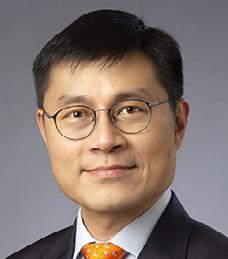
BBVA has appointed Stephen Cheuk Wa Sun as head sales, global equities, Asia, to continue building an investment product franchise in Asia Pacific after setting up an equity trading and sales hub in Hong Kong SAR. The hub will be a local extension of the global product capabilities of BBVA in the manufacturing of structured investment products for private banks and asset managers in Hong Kong and Singapore, both through traditional and digital channels.
Cheuk Wa Sun (pictured) reports to Eric Michl, head of equities, Asia, who joined the Spanish bank in September from Natixis, and to Carlos Gil, global head of equity sales.
Cheuk Wa Sun will be responsible for the equities sales team as the Spanish bank seeks to leverage his wealth of experience in the sale and distribution of structured products, after more than 20 years in the financial industry.
He joins from DBS Private Bank, where he was an investment consultant. Prior to that, Cheuk Wa Sun held senior sales positions at Barclays, Deutsche Bank, J.P. Morgan and Nomura.
Singapore Exchange (SGX)

Keri Neo, the head of SGX’s securitised products business, has parted ways with the Singapore exchange after 14 years of service to join Tradeweb in a product and business development role focusing on equities and ETFs electronic trading.
Neo (pictured) was head of securitised products focusing on product development and management for listed products including exchange-traded funds (ETFs), structured warrants and daily leverage certificates (DLCs) since October 2018. She was promoted Neo to this role after four years as head of product management and development, securities, at SGX. Based in Singapore, Neo reported to Chan Kum Kong, the head of research and products equities and fixed income at SGX.
Neo had been responsible for the exchange-traded fund (ETF) business at the exchange since 2014. Prior to leading the ETF business, she built her career in the derivatives business at SGX for around five years, in several roles including product development and management of equity index futures as well as options. Neo first joined SGX through the exchange’s Management Associate Programme, aimed at selecting young talent within SGX.
Neo’s departure is the second high-profile exit after Simon Karaban, head of index services at SGX, left the exchange last week. Neo was the recipient of the Personality of the Year award 2020, after securing the most votes from market participants in SRP’s Asia Pacific awards 2020 survey.
The exchange has also parted ways with Simon Karaban, head of index services at the Singapore Exchange (SGX).
Karaban joined SGX in March 2013 and has led the development and launch of the SGX Index Edge index business and the introduction of new indices and index services for global clients. This includes the exchange’s SGX Thematic Indices, a suite of equity indices under its index business.
Launched in October 2015, SGX Index Edge was launched to offer comprehensive index services for issuers, asset managers and investors in Asia, as well as to better profile key segments of its securities market and deliver bespoke calculation capabilities that will enable clients to build tailored indices.
Prior to joining SGX, Karaban was the director of research and design for S&P Dow Jones Indices based in Hong Kong, where he was responsible for the development of indices
45 www.structuredretailproducts.com SRPInsight
PEOPLE MOVES
across asset classes for the Asia Pacific region. He also worked for Morningstar as a product manager for the research data business, developing and commercialising research data solutions for institutional clients.
Kepler Cheuvreux Solutions

Kepler Cheuvreux Solutions has appointed Marc Père as cross asset investment solutions sales. In this role, Père will be responsible for equity derivatives and structured products sales in the Benelux region. He is based in Paris.
Père joins Kepler from Leonteq, where he worked for 5.5-years as an associate equity derivatives and structured products sales for the Benelux and Israel, also in Paris. At Leonteq he reported to Sebastien Noujaim and Nathanael Gabay, co-heads cross asset structured products sales Benelux & Israel.
Prior to that Père was an analyst global equity and commodity derivatives sales at BNP Paribas Corporate and Institutional Banking (CIB) in Brussels.
Valour

Valour, a subsidiary of DeFi Technologies has appointed Tommy Fransson to the role of chief executive officer effective 1 January 2022. Fransson (right) most recently served as deputy CEO at the Nordic Growth Market (NGM) and head of the Nordic Derivatives Exchange for almost 10 years. He will replace Diana Biggs, who will move to DeFi Technologies, Valour’s parent company, to take on the chief strategy officer role.
Biggs will continue in her role as CEO until Fransson joins, as well as fulfilling her role at DeFi Technologies.
Fransson was appointed head of the Nordic Derivatives Exchange in 2008 replacing Roger Peleback. Prior to that, Fransson spent two years as deputy head of Nordic Derivatives Exchange and head of listing and issuer services.
Biggs joined Valour in February 2021. Prior to joining Valour, Biggs was global head of innovation for HSBC Private Banking, where she led on fintech partnerships and driving open innovation. Earlier roles include VP, head of growth & partnerships, Emea for digital currency platform; chief strategy
officer for e-commerce startup Soko, and management consultant at Oliver Wyman Financial Services.
As of 14 October 2021, Valour had surpassed US$250m in assets under management (AUM) trading on the NGM – Valour offers a range of exchange traded products (ETPs) tracking the price of the main cryptocurrencies including Bitcoin Zero and Ethereum Zero and has introduced ETPs on Ethereum, Cardano, Polkadot, and Solana.
Amundi appoints head of marketing & products
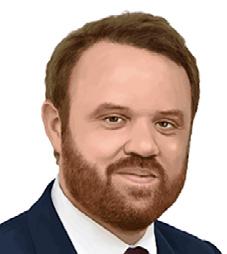
Amundi has appointed Eric Bramoullé (pictured) as head of marketing and products, effective 1 November. Bramoullé has been part of the company for 22 years and most recently served as CEO of Amundi South Asia, following CEO positions at Amundi Austria between 2015 to 2018 and Amundi Poland from 2013 to 2015.
Albert Tse, former head of distribution sales and marketing for Amundi, succeeds Bramoullé as CEO of Amundi South Asia.
Prior to this, Bramoullé was head of retail networks equity management from 2010 to 2013 and deputy head of equity fund management from 2007 to 2010 at Société Générale Asset Management. Before that, he was a vice president of the investment risk and process control department for SBI funds management in India. Bramoullé started his career at Société Générale Asset Management in 1999.
Amundi has also appointed Gilles Cutaya as deputy head of Amundi marketing and products.
Cutaya has worked as head of marketing and communication since 2015 and deputy CEO of CPR since 2019.
Prior to this, he held several positions at Lyxor Asset Management, including global head of client relations and services and head of marketing and strategy. He also worked at Axa Investment Managers from 2004 to 2007 as a product engineer.
The French asset manager owned by Crédit Agricole and Société Générale is an active provider of structured products to retail investors. Amundi is a top 10 issuer in Europe year-to-date via its Amundi Finance Emission vehicle – it has marketed 13 products across Europe worth an estimated US$1.5 billion so far this year.
Amundi has almost 200 live products across a number of markets in Europe, including 174 products in France worth an estimated US$19 billion, and 10 products in Italy worth an estimated US$2.3 billion.
46 www.structuredretailproducts.com
PEOPLE MOVES
SRP NEW LIFECYCLE MANAGEMENT PORTAL
SRP has entered into a joint venture with FVC to design a lifecycle management portal with a single sign-on, to be powered by SRP database. Technical specifications allowing eligible SRP subscribers to access the portal with their existing SRP access credentials to be announced during the SRP Americas event in September.
The purpose of the lifecycling portal is to provide a complete structured product selection, monitoring and analysis system. The portal will have different use cases depending on client and jurisdiction. Its primary function is as a fully featured structured product management tool for advisers, brokers and smaller buy-side firms such as discretionary fund managers and family offices.
Initially the valuation service will cover live products on the US database across the most popular payoff types such as Autocall, Reverse Convertible, Leveraged Upside, Participation, Digital and Twin Win across a large selection of underlyings, issuers and maturities covering thousands of live products. This new valuation service will then be rolled out to other markets globally in 2022.
e:
p:
FOR MORE INFORMATION PLEASE CONTACT: Reihaneh Fakhari | Business Development Director
Reihaneh@structuredretailproducts.com
+44 (0)20 7779 8220
+44 (0)79 8075 6761 Raul Enciso-Portoles | Head of Sales, Americas e: raul@structuredretailproducts.com p: +44 (0)20 7779 8222 m: +44 (0)79 7146 4509 1. DESIGN PRODUCT WEALTH MANAGERS BACK OFFICE BLOOMBERG SIX SIS SGX EUWAX CONNEXOR ISSUERS 2. REQUEST FOR OFFER 3. ACQUIRE QUOTES 4. MAKE DEAL 5. PUBLISH 6. MONITOR EVENT 7. REPAY FULL INVESTMENT CYCLE
m:
KEY BENEFITS OF THE LIFECYCLE MANAGEMENT PORTAL INCLUDE:
Direct structured product governance tool for financial advisers and brokers. Typically, there are three layers to usage for a medium to large company – firm wide compliance, by adviser and by individual end client.
Dynamic product reports: Reports for each individual structured product in the universe will be updated and produced on a regular basis (at least weekly). These will be based on the successful adviser facing Structured Edge report concept that has been used by thousands of advisers in the UK for the last twenty years. And more…
www.structuredretailproducts.com

























































































